#Studio Trial Five
Explore tagged Tumblr posts
Text
'Why creatives are seeking residuals' - thread by Stefanie Williams
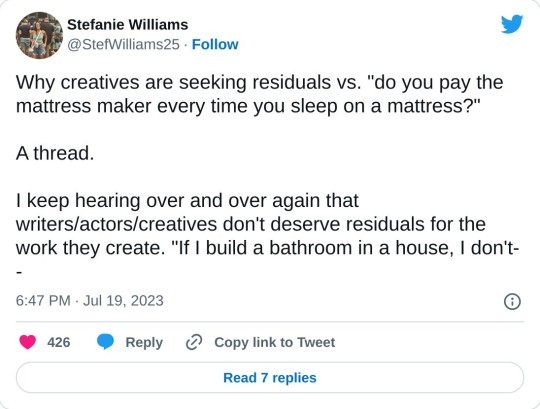

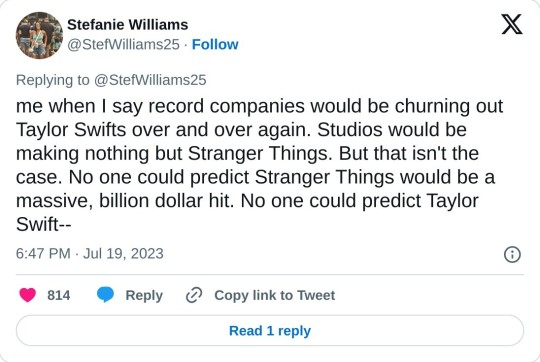
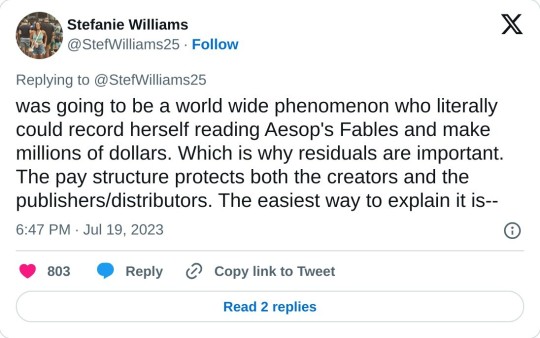
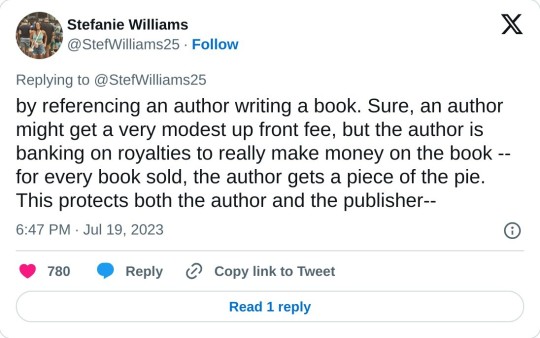
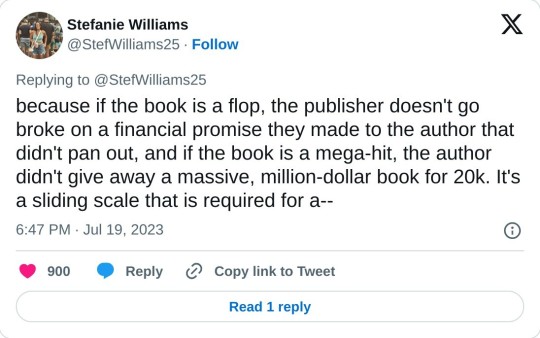
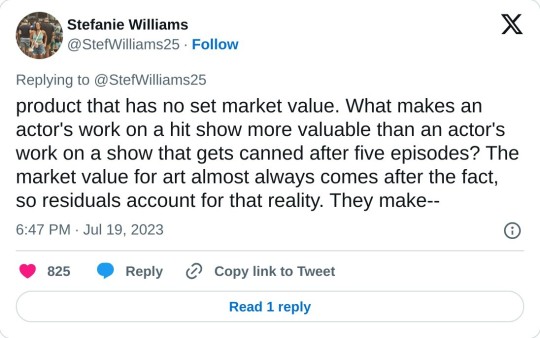

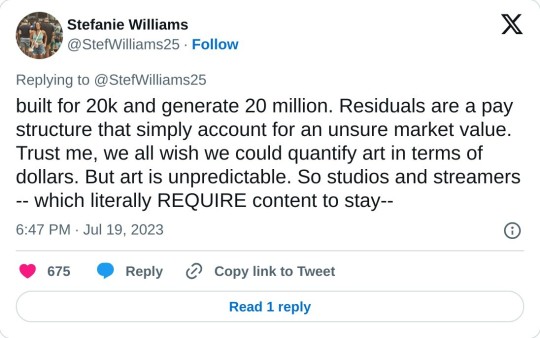
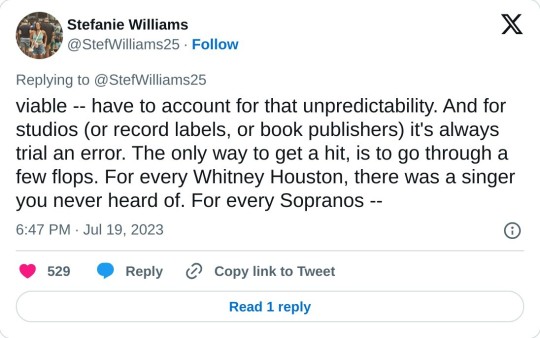
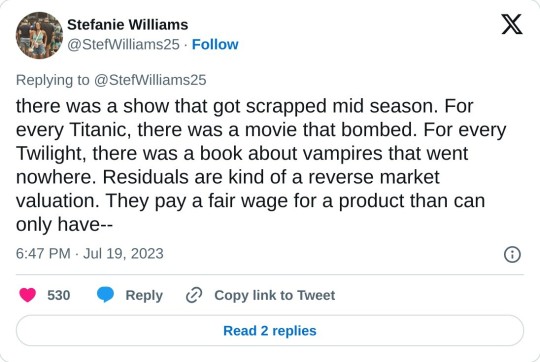
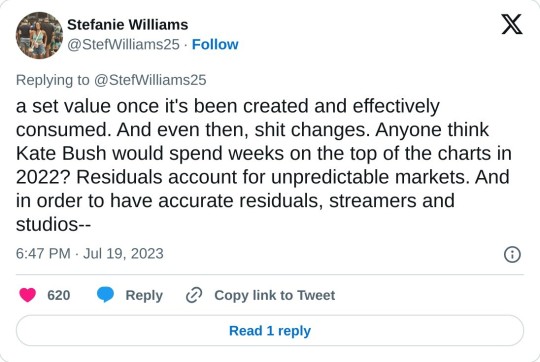
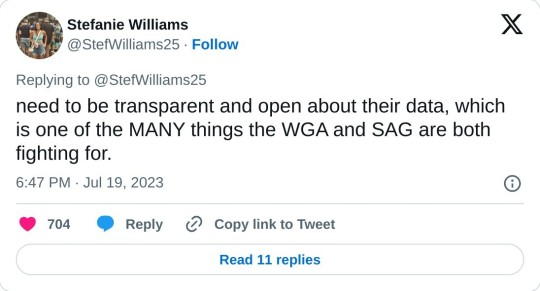
[Tweet thread by Stefanie Williams @/StefWilliams25
TRANSCRIPT:
Why creatives are seeking residuals vs. "do you pay the mattress maker every time you sleep on a mattress?" A thread. I keep hearing over and over again that writers/actors/creatives don't deserve residuals for the work they create. "If I build a bathroom in a house, I don't get paid every time someone uses the toilet."
TRUE! However, your bathroom build has a set market value. Art does not. No one knows what makes one TV show an overnight success, and another a flop. No one knows what makes one song a hit, and the other a dud. If they did, trust me when I say record companies would be churning out Taylor Swifts over and over again. Studios would be making nothing but Stranger Things.
But that isn't the case. No one could predict Stranger Things would be a massive, billion dollar hit. No one could predict Taylor Swift was going to be a world wide phenomenon who literally could record herself reading Aesop's Fables and make millions of dollars. Which is why residuals are important. The pay structure protects both the creators and the publishers/distributors.
The easiest way to explain it is by referencing an author writing a book. Sure, an author might get a very modest up front fee, but the author is banking on royalties to really make money on the book — for every book sold, the author gets a piece of the pie. This protects both the author and the publisher—because if the book is a flop, the publisher doesn't go broke on a financial promise they made to the author that didn't pan out, and if the book is a mega-hit, the author didn't give away a massive, million-dollar book for 20k.
It's a sliding scale that is required for a product that has no set market value. What makes an actor's work on a hit show more valuable than an actor's work on a show that gets canned after five episodes? The market value for art almost always comes after the fact, so residuals account for that reality. They make sure the creator get compensated at a fair market rate. A person who builds a bathroom knows, upfront, what the market rate for a bathroom is. That bathroom won't suddenly be worth 1000 times more than you built it for in six months. It doesn't have the potential to be built for 20k and generate 20 million.
Residuals are a pay structure that simply account for an unsure market value. Trust me, we all wish we could quantify art in terms of dollars. But art is unpredictable. So studios and streamers -- which literally REQUIRE content to stay viable -- have to account for that unpredictability. And for studios (or record labels, or book publishers) it's always trial and error. The only way to get a hit, is to go through a few flops.
For every Whitney Houston, there was a singer you never heard of. For every Sopranos, there was a show that got scrapped mid season. For every Titanic, there was a movie that bombed. For every Twilight, there was a book about vampires that went nowhere. Residuals are kind of a reverse market valuation. They pay a fair wage for a product than can only have a set value once it's been created and effectively consumed.
And even then, shit changes. Anyone think Kate Bush would spend weeks on the top of the charts in 2022? Residuals account for unpredictable markets. And in order to have accurate residuals, streamers and studios need to be transparent and open about their data, which is one of the MANY things the WGA and SAG are both fighting for.
#sag-aftra strike#sag strike#actors strike#union solidarity#support unions#fans4wga#described#wga strike#writers strike
3K notes
·
View notes
Text
Lola Glaudini shared a new story about Johnny Depp from the set of the 2001 film ''Blow'' on an episode of the Powerful Truth Angels podcast in January. The actress says the experience was brought back to her mind while watching news footage of the Depp/Amber Heard trial.
Johnny Depp… comes up to me, sticks his finger in my face. And I’m in a bikini, on the ground, like this. And he comes over and he goes, ‘Who the fuck do you think you are? Who the fuck do you think you are? Shut the fuck up. I’m out here, and I’m trying to fuckin’ say my lines, and you’re fuckin’ pulling focus, you fucking idiot! …Oh, now? Oh now it’s not so funny? Now you can shut up? Now you can fuckin’ shut the fuck up? Oh it’s not funny now? Okay, the quiet that you are right now, that’s how you fuckin’ stay.’ First day on the set. I’d never met him. This is my first studio movie, I’ve just done indies until then. And I have the star who I have idolized, who I’m so excited to work with, reamed me in my face. The only thing going through my head was, ‘Don’t cry, don’t cry, don’t cry, don’t cry, don’t cry.’”
Demme didn’t intervene on Glaudini’s behalf, and over the next “five, six more hours” she was treated by everyone on set as a “pariah.” “Like, no one wanted to fucking talk to me, because I’m the bitch who he railed at,” the actor recalls. Afterward, she went to her trailer and sobbed, then spoke to her father, who said she could either choose to walk away or “don’t let them see you sweat.” Resolved to stay on the film, she left her trailer and was confronted by Depp again. Looking down on her from the doorframe of her own trailer, the star gave her “a non-apology apology,” giving excuses that he was “really in [his] head” and that the Boston accent he was doing was “really fucking with [him].” When he said he wanted to make sure the pair was “cool,” “I just looked at him and I was like, ‘I don’t even know what you’re talking about. Of course. Totally cool,” Glaudini says. “’Cause I was just like, don’t let them see you sweat. And so that was that. And then we had six weeks in Acapulco.”
272 notes
·
View notes
Text

You always thought the circus was where you yearned to be. At least, until it finally let you in—and introduced you to Hanta Sero.
[circus AU where seamstress!reader and acrobat!sero realize that their lives have been running parallel for a long time, and it’s up to you to weave them together]

part 1: one brighter than the rest.
sero hanta x reader ch 1/6 | 12.1k words | masterlist | ao3
cw: mentions of past death of a family member notes: chapter song is gloria by kendrick & sza
the circus arrives in Milan, and you arrive at the circus. someone special welcomes you personally.
✰.
"Inside every adult there's still a child that lingers. We're happiness merchants—giving people the opportunity to dream like children."
-Guy Laliberte, co-founder of Cirque du Soleil

The circus is coming. For you.
✰.
The knock on your door is five minutes late. It raps with firm rapidness, demanding a sense of urgency. You scramble to stand from your seat, dishes clattering against the table when you bump it with your knee, and scurry to greet your guest. He looks unamused when you tug the door open, eyes barely darting over unkempt hair and wrinkled clothing—maybe because he looks the same. You don’t bother with greetings, instead informing him that you’ll open the garage.
You kick the door closed as you start down the hall. The floorboards squeak under quick steps, feet threatening to slip from the softness of your socks. They’re struck with a chill on the soles when they land on bare concrete, carrying you along the wall to press the button on its surface.
Light slowly floods your workspace, trickling in from the bottom as the shutter lifts from the ground. Green grass and grey pavement fill the frame, soon joined by the red brick of neighboring buildings. The chilly air of February rushes in, prickling your uncovered arms with goosebumps. Grating sounds soak the air, rusted joints running along the frame of the large garage door.
The man is still by your front door, typing rapidly on his phone, when you step out onto the driveway.
“Qui!” You wave him over.
It successfully grabs his attention, pulling his head up and starting towards you. He looks annoyed.
“I don’t know Italian.”
You blink in realization. “Oh,” you say, preparing your brain to switch to English. “Sorry, I was telling you to wait by the garage.”
He nods curtly, eyes moving from you to the mannequin near the center of the room. He slips his hand into his pocket, digging out a key. “I’ll back up the van.”
You use the time to wheel your work to the edge of your studio. Tender fingers carefully grasp the waist of the wool figure—now draped in layers of delicate fabric and feathers—as you press your foot against the latch of the wheels, unlocking them. The mannequin gently rolls forward with your guidance until you step on the lock again. You look fondly at the gown, recounting the many transformations it went through to get here. Sleepless nights, panicked phone calls, trial and error. Despite the vexation this dress throttled you with for the past few months, a tremor waves through your heart knowing that you’ll part with it soon.
You turn to retrieve three other items. The first is a massive headpiece, delicate and jarring as you walk the display head to sit next to its counterpart. The other two are boxes, one filled with extra fabric and feathers, folds and wispy tufts spilling from the rough cardboard, smaller containers of beads and faux jewels shaking within. Another is a carefully organized plastic bin: your essential tools, the only orderly part of your process.
The man stops the van just before the garage door, right as you set the box behind your mannequin. He moves to open the metal doors, the click of the latch and squeaking hinges welcoming you into the dark space. There’s an assortment of cardboard boxes coating the floor—makeshift cushions, so the mannequin won’t slide en route. You unlock the wheels of the figure once again as the driver pulls out the ramp. Once it rests steadily on the ground, you push forward carefully.
You pause at the sound of rustling behind you. Turning to see the man lifting the box of fabric, you relax at the sight and continue your journey onwards. You nudge boxes with your foot, still bare of shoes, and slip the support of the mannequin between them. When it’s far enough inside to put you at ease, you hurry back down the ramp to retrieve the headpiece.
Once your supplies and costume pieces are secured in place, the driver looks at you expectantly from outside the van. You shake your head as you walk down the ramp.
“I’ll sit back there with it,” you tell him, unwilling to take the smallest chances. He nods unbothered. “I’ll just be a minute.”
You head back through the garage and into the hall, pulling your socks off and strewing them across the ground. You quickly gather your essentials and slip on a new change of clothes—wrinkled and sloppy, but warm enough to withstand the chilly air. You step haphazardly into your shoes and inhale the remainder of your breakfast before returning to the garage. You smack the button on the wall, dash to the closing door, and then step over the sensor while crouching under the door in time to leave. The driver is still waiting, eyes passing over you when you scurry into the back.
He pauses before closing the door, metal slamming against itself with a clang. You are shrouded in darkness, eyes fuzzy as they slowly adjust. You catch the silhouette of bundled feathers, the curve of fabric wrinkled around the waist of your model. A sliver of light peeks through the corners of the van, enough to vaguely illuminate the royal red of your gown. You carefully slip your legs under the cage of the skirt, holding the support stand between your calves while your feet press against the top of the pedal. The dress is still warm from your garage, warmer than the cold bench you’re seated on. You grasp the neck of the display head at your side, holding it sturdy as the engine thrums to life. The first lurch of the car has your heart pausing in anticipation, body clenched to keep everything steady, but you relax when the vehicle presses forward smoothly.
Once you confirm the steadiness of your hold and the driving, you fumble for your phone. The time reads just a quarter past noon—you’re moving faster than expected. You open your messages and send a one-handed text that you just left your apartment. The response is immediate: ‘See you soon!!’
You cradle your projects for nearly half an hour. Despite the darkness, you can follow the journey of the van from the sensations of the drive alone—the turns from one road to another, the oscillation between smooth pavement and bumpy cobblestone paths. You know this route from the western outskirts of Milan into the Cerchia dei Navigli, a bustling center of ornate gothic structures, rich opera history, and lines of designer boutiques. The essence of fresh pasta dishes and red wine wafts through the openings of the van. The storefront of your favorite osteria runs through your mind, spilling clusters of tables and chairs into the street, along with clinking glasses and the ting of silverware.
You relax, imagining the comforts of your regular places. Their distant visuals soften the thumping in your chest.
It’ll be fine. You know your client will like your work, you know the gown functions as it needs to, and you know your craftsmanship. Your work is good. You know this. The only variable left is transportation, which has nearly come to an end. You feel the van stop, the engine quieting with it.
Your legs relax and loosen their hold on the mannequin. Clanging erupts from the back of the aluminum cage, the driver pulling the doors open. You’re momentarily blinded by a burst of sunlight, reflecting off the white and red fabric you are parked before—stretched canvas taught against the framed structure beneath. You waste no time standing and shoving boxes out of the way, unlocking the mannequin wheels to walk it down the ramp. The driver watches closely, but waits silently as you reenter to get the headpiece.
You hear a shout as you walk down the ramp. It comes from a soft voice, sounding almost nervous. “Aizawa-san!” It calls, a stream of Japanese following. The driver turns his head at the sound. You realize it must be his name, recognizing the honorific.
When you step down onto the plaza, you catch sight of the owner of the voice: a man with striking green curls, some sticking against his forehead and cheeks. He wears a tight-fitted top that reads “practice shirt” and a pair of athletic shorts. He converses with who you assume is Aizawa, and you realize he must be one of the acrobats.
His eyes dart to you, then the mannequin head. His eyes brighten, almost shine, and suddenly you are bombarded with a slew of questions, spoken in heavily accented English.
“Wow! You must be the artist Kendou commissioned! Is that Momo’s costume? It’s incredible! It reminds me of Carnival in Asakusa—”
The rest of the words pass through you, a jumble you can hardly understand—both from the speed of his rambling and his accent. But you smile brightly at the compliment. The mention of Asakusa Samba with its feathers and accessories, patterns blending traditions from across the globe, was exactly the vision. Yours takes a much more modest approach, but the influence is clear—at least for someone who knows their Carnival. You appreciate someone who can trace those lines of inspiration, pick apart your brain and your thought process. It strikes you with a special sort of pride.
Before you can respond, the man you’ve decided is Aizawa interjects. “Midoriya.”
The mumbling halts and now the curly man is blushing, waving his arms around. “Gah! Sorry... I—”
Aizawa cuts him off, saying something in Japanese and gesturing to the van. To get your boxes, you think. He turns to you. “Which one should I carry?”
Your stomach clenches. You don’t like the idea of either being out of your control, but the answer is obvious. You hand him the mannequin head, watching as he grasps it by the neck and then immediately turns to walk away. You hold the waist of your mannequin and follow him slowly. The eagerness in your heart, the prospect of being so close to finished, calls you to sprint forward, to see this through. But you force yourself to walk slower than normal, to let this final moment stretch on a little longer. You know when you return home later, to a studio empty of its recent fixation, you’ll feel hollow inside.
As you wheel the dress along the giant tent, your eyes drift up its shaped canvas cover, stark against the blue sky. Yesterday this piazza was empty, holding its usual clusters of tourists and performers and lingerers. Overnight, a structure large enough to hold a stage and an audience was erected. People knew the circus was coming—Hoshi no Sākasu, Circus of the Stars—and yet as per usual, it appeared in an instant. Impossibly.
You feel giddy, brimming with curiosities about the magic these people can conjure. How does an auditorium simply appear? And in the middle of one of Milan’s most notorious attractions, now fenced along the edges. But Hoshi no Sākasu is notorious for these sorts of stunts. You’re familiar with the circus, having been a fan of costumes and impossibilities since a child, but you’ve never known magic like this.
Your eye catches a gap in the fabric, a flap gently brushed open. You can see the stage setup at the front, the congregation of various athletes on their props. You yank your head forward, away from the tempting preview of the show to come. You don’t like to spoil these events for yourself, too invested in viewing the delivery of a performance as an unsuspecting spectator—a blank slate for a story to unfold.
You hear a huff beside you: Midoriya, having caught up somehow carrying both boxes—your plastic bin awkwardly small under the larger cardboard box. You feel some unease at his determination to make one trip, but your watchful eyes don’t catch any real problems with his method.
“It’s okay to have a look,” he says somewhat breathless. “Knowing what happens behind the scenes can make the performance more enriching!”
“And ruin the surprise?” you ask. “I’ve never seen a Hoshi no Sakasu performance. I want my first time to leave me blown away.”
He gapes. “You’ve never seen one? I thought circus costuming was one of your biggest inspirations. You said you’ve seen nearly a dozen of Cirque du Soleil’s shows, and you’re familiar with most other major circus productions.”
A wave of embarrassment rolls over you. The feeling festers in your shoulders, making you want to hide behind your mannequin. It’s one thing for people to know your work, mostly opera gowns and period dresses. It’s another to meet someone who’s read you, articles and interviews you couldn’t force yourself to relive. Not that you made any particular fumbles, but you never do well under spotlight. You prefer the shadows of the costume rooms, creating opulent or kitschy regalia for others to flaunt.
“It is. I have,” you respond. “But your circus has only toured in Asia. And I can’t watch online performances before the real thing.”
Midoriya makes a thoughtful noise beside you. You worry that he’s going to launch into another tirade of mumbling when you see Aizawa enter the next flap of the tent. You decide to speed your walking to a normal pace.
“Is this the wardrobe?” you ask.
Midoriya brightens, switching gears with ease. “Yes! Kendou and Momo are there now. These tents are such interesting spaces—”
You see it for yourself when you enter, carefully pulling the loose canvas aside to roll the mannequin along. The room is large with awkward corners, the chord of a circle. You catch the section of the wall with the stage entrance where the performers are currently congregated behind, separated only by a curtain. Chattering and clattering waft through the opening, the ambiance of their practice. There are props strewn about backstage, scatterings of belongings laying on tables with giant mirrors, and an array of costumes hanging on moveable coat racks. Your hands grip the waist of your lay figure, itching to sift through the final designs for the show.
You stop yourself when you catch fiery orange hair. “Kendou,” you say excitedly.
She leaps to you, away from Aizawa and the headpiece, and gasps, eyes twinkling with excitement as she calls your name in return.
“Wow,” she says, running a hand slowly over the dress. She gently lifts the base of the first layered skirt ruffles, threading her fingers along the wrinkles, the transition of red to white beneath. “You dyed it perfectly. And the details... just wow. I knew you were perfect for the job.”
That sensation of pride creeps back up your body, pulling you to stand straight with a grin. This piece was one from your roots—reaching back to your early works of parade dresses and costumes based on the birds of your home. You consider yourself an expert on the matter, emulating silhouettes and movements of macaws, toucans, hummingbirds. Even the mythical creature you were challenged to emulate for this dress, the mighty phoenix, you knew was well within your wheelhouse.
The process, admittedly, was the most challenging part. Rather than starting with fabrics and textures, design for this production began with a clear goal: the phoenix, and the mechanics of the gown in the illusion that would unfold. You started with white fabric and a silhouette, working with the proportions of Momo’s body and the creature in your objective. Then you iterated through textures, round after round of cutting fabric edges, stitching, adjusting, deciphering the best method of wrapping the fabric on Momo’s body. Afterwards came sizing, which involved a plane ride from Musutafu to Milan, for Momo to try on the prototype, finalize the details of the fit, and test how the fabric and headpiece would move during the choreography. Once you knew her patterns, it was time to dye and cut and stitch, a grind to complete the final work in just two weeks. You finished the base of the dress in two days, the headpiece in two, and spent five grueling over details—sewing in stones and feathers, and making additional fabric details to fix in place. You gave yourself a few days to stop thinking about it as best you could, before spending the past days fine-tuning the details.
Momo approaches, eyes glassy with awe. “It’s incredibly beautiful. We were right to trust you. I can’t believe this is the result.”
You appreciate them, their trust. The gown was just a swath of white fabric when they visited, still rough around the edges. Enough to understand how it would move and appear in silhouette, but requiring an active imagination to see it as a finished piece.
But enough praise. You want to see it on.
“Shall we?” you ask.
The energy shifts immediately. Kendou is behind you, taking in your instructions for the best process to get the gown from the mannequin to Momo. You first unlatch the crinoline from the waist of your figure, gently pulling it down. Kendou has to help you remove the figure from the support so you can free the hoop skirt and hand it to Momo. While she steps out of her outer clothes and brings the frame in place, you notice neither of the men have left. Aizawa watches blankly while Midoriya averts his eyes, choosing instead to stare at the headpiece on the table.
Once the support is secured, you remove the dress from the mannequin. You make a show of where the zipper starts and how far it runs for Kendou to reference. You lift the sleeves upwards, Kendo’s sturdy hands assisting you, and Midoriya steps in to help, carefully grabbing the bunched fabric of the skirt. It lifts easily over Momo, lowering in time for her to slip her arms through the sleeves. Once her hands appear from cinched wrists, you immediately begin to adjust, picking at the fabric around her waist to smooth out any twisting. Kendou traces along the neckline to straighten it. You look at Midoriya, the way he awkwardly tries to fluff the fabric over the hoop skirt. You swoop in to help, fingers confident as they unpin the bundle of chiffon at the back, letting it spill vibrant orange—hot magma, you think—onto the ground, protected by a sheet.
You hear Midoriya squeak as your hands skirt past his, essentially smacking them aside.
“Sorry!” he squeaks. “The other costume crew are out right now. I don’t normally get to help.”
You huff with a smile. “It’s fine. You like being on wardrobe duty?”
“Yes!” he says immediately. “It’s interesting to think about what types of fabric or shapes suit the acrobats and their acts. It really brings the characters alive, and yet not something I’ve had many chances to explore!”
You hum in agreement as you turn to the table with the headpiece. You gently work the elastic off, gripping at the hard plastic further up. Once secure in your grasp, you turn to hold it over Momo’s head, her hands meeting yours to catch the edges. It sits snug and straight despite the asymmetrical display of feathers. They fan to your right and sway gently with her movement. You let Kendou fuss with the details, ensuring it sits comfortably while you take a step back to admire the costume in full.
Even in the backroom, the costume has a magnifying presence. It commands attention. You let your eyes scan down Momo’s figure, the details of the feathered top that transitions into the mask, swirls of wire and mesh covering the top of Momo’s face, pointed dramatically at the ends in a sharp beak. Delicate pieces of wire frame her like a halo, tipped with feathers and sparkling gold jewels. They bounce softly with the slightest turn of her head, twinkling under the lights.
Her collarbones are framed by a heart-shaped neckline coated in sheer ruffles. They match the fabric of the shoulders and arms, cinched and falling in a classic bishop sleeve, sporting additional ruffling at the wrists. The chiffon is a bright red, tipped with the pop of orange. The bust of the dress is a contrasting dark maroon, coated with your signature detailing—intricately sewed jewels, beads, and buttons in abstract swirling patterns. The detailing trails down the waist, and fades into the front of the skirt. The fabric below the hips is generously layered, appearing dark and red as it sits upon itself and runs an inch on the floor. The transparent ribbons of orange lay elegantly on the ground, wrinkled carefully to retain volume. One of the bottommost layers of fabric is embroidered with the cursive swoops of your artist’s name: Verde, meaning green in both Italian and Spanish.
When the outfit is secure, Momo takes a few steps as a test. The fabric flutters over her arms and swishes around her waist. She experimentally spins, only about a quarter turn, and your breath hitches. The layered skirt lifts perfectly, exposing the bright white fabric below. You can imagine the act with full clarity, what will unfold on the stage.
“Ugh,” Kendou groans with delight. “It really... It's perfect. I couldn’t have dreamed of anything better. It’ll be the center of the show, like we wanted.”
Your heart swells further at the compliment. This is what those sleepless nights and raw fingertips were for, what they amount to. Not the praise, but the fulfillment of a vision—a dream finally coming to life.
Midoriya breaks you from your trance. “This is incredible! The costume crew and Momo have kept the rest of us in the dark the whole time. The others are going to be blown away when they see it.” He traces a gentle hand along one of the layers of the skirt. “Is it silk and chiffon? I’m trying to learn more about fabrics.”
You nod. “Chiffon for the sheer fabric, but a silk alternative for the skirt and bust. I’ve been experimenting with different alternative fabrics, and your team agreed to let me use plant lyocell after looking at my other pieces and how they’ve aged. It’ll be fine since Momo’s act isn’t demanding on the costume.”
Midoriya’s eyes shimmer, but Momo chimes in before he can respond. “I hope my performance can live up to the extravagance of this dress. I’m sure you have a critical eye for opera with your line of work.”
You roll your eyes. “You and your voice are stunning. It’ll be the best performance I’ve ever seen,” you reply honestly. “I’ve never been to an opera with an entire circus backing it up. Besides, I’m tired of standard gowns.” It pays well, with old money and prestige, but you inch closer to losing your sanity everytime you make another sleek, dark gown. You want flare and drama and the room to be eccentric. This commission was heaven sent, for giving you something you’ve been craving.
“Ever think about circus costume?” Kendou asks. “Full time, full commitment?”
You freeze. Your eyes blink rapidly, your heart following its pace. You tread carefully, unsure if this is a job offer or a thought experiment. “In my dreams. Never thought it was possible, though.”
You see Momo’s eyes widen at the admission. Kendou continues, “It is, for you. You should consider it.”
Your fingers tingle, body thrumming with anticipation. You think you might be sick. You look at her pleadingly. “Kendou, I have orders through June—”
She shakes her head. “Afterwards. Our traveling season ends in September. October is when we start preparations in Japan.”
There’s a lump in your throat you can’t swallow. You try to calm your expression, knowing you look like a deer in headlights, but your mind races with possibility. Then it fills with logistical questions—your home, your studio, the language barrier. You try to blink them away as you look into Kendou’s teal eyes. They’re strong, intense. One eyebrow is quirked, challenging you. For a moment you see the bright blue of the sea in her irises, waving against the black sand of her pupils.
She speaks before you do. “Just think about it, yeah? You have time. We can talk it over.”
All you manage is a nod, afraid of the noise you might make if you speak. Your eyes move to the others in the room, Momo’s curious gaze and Midoriya’s shining expression. Aizawa still looks bored, unbothered, and you find comfort in his nonchalance.
You clear your throat, ready to change the topic. “Okay. Is there anything else we need to run through? Adjustments? Final touches?”
Kendou waves her hand, turning back to Momo. “You should go, take the day off. You know I won’t botch your work. It’s perfect anyways.”
Despite your hammering heart wanting to run yourself out of the tent, your mind whirs at the potential work to do. “Are you sure?” you ask. You trust Kendou and her skillful touch, but this was your baby for months. Your stomach clenches knowing it’s no longer in your hands.
“Go,” she says, then turns to Midoriya. “You too, you should get lunch together. We need to get the dress on the stage, and we don’t need you pulling a muscle last minute again.”
His freckled face flushes, eyes widening comically. You see the start of a protest form on his lips before you interject. “You get to have real Italian pizza yet?”
He shakes his head slowly, eyes trailing to you.
“C’mon, I’ll treat you,” you say. You would rather run out of here alone, to call your friend Chiara and hyperventilate over Kendo’s offer. But you’re drawn to circus people, those who get paid to make a spectacle of themselves. You can postpone your breakdown to indulge in time with a professional clown.
He flushes a shade darker, before stuttering through an, “O-okay!”
Kendo’s mouth smirks in your periphery while she examines the details of the dress, fussing over the ruffles on the shoulder. “Change into something warm,” she instructs.
The tumble of syllables that fall from his mouth are incoherent—you can’t tell if they’re Japanese or gibberish, maybe both. He scurries to the tables where bags and clothes are gathered, pulling out a square yellow pack. He grabs for a pile of fabric and then rushes into one of the changing stalls.
You pull out your phone, glancing at the time before opening your messages. You send a slew to your friend, getting the main point across that you need to talk later. Desperately. You notice a recent message from your sister and quickly swipe it away without reading it.
Aizawa’s voice pulls your attention back. “Do you need a ride?”
You turn to him, shaking your head. “No, we’ll be in the area. I can take the mannequin back with me on the metro later.” You pause before adding, “Thanks for driving. I can’t stand packing costumes. And sorry for the awkward first meeting... Aizawa?”
He nods, affirming the name. “It’s fine, it wasn’t any issue. It’ll have to be packed when we’re on the road, but Kendou will manage fine.”
“Aizawa’s one of the producers,” Momo says.
Your eyes widen, heart stumbling to your stomach. A producer? You recount the way you hurried him along just an hour earlier. Maybe he was nonchalant about Kendo’s job proposal because he was planning to make her rescind it. He laughs dryly at your expression.
“Don’t worry,” he says with a dark mirth. “I know how you costume people get, especially close to showing.”
You are saved by the return of Midoriya, dressed in a silhouette you think is quite stylish, but you have to suppress a grin at the clash between the garments. Bright dotted yellow lays against patterned maroon, flush against saturated cobalt painted with white details. Primary colors. You like this guy.
You tell Kendou that you’ll be back after lunch, at the very least to retrieve your lay figure. She and Momo wave you off with smiles. Midoriya leads you out of the tent and into the brightness of the day. Cool air nips your face and hands, but it calms you, brings ease into your body.
You look around the piazza. The paved square is fenced, littered with guards outside the perimeter. Over the top of the large tent is the pointed roof of the Duomo di Milano.
“How do you do it?”
“Huh?”
“The tent,” you clarify, turning to meet his eyes. “How does it just… appear? Without warning—without anyone seeing.”
A cheeky grin crawls along the side of his face. “Can't say,” he answers vaguely with a hum, before diverting his eyes.
You huff, turning back to the blue of the sky. Is that the sort of thing you would get to learn about, to understand intricately, if you joined them? You want to whine in annoyance, but the tufts of clouds leisurely drifting above catch your attention. You think you can make out a rabbit, hopping to an apple twice its size. You’re about to point it out when Midoriya speaks.
“I don’t know where we’re going... ” he trails off, his smile now embarrassed.
“I do. Can we exit from the north?”
He nods. You start walking left of the duomo’s face, towards one of the restaurants you frequent when you’re in town. Midoriya trails behind you, easily falling into conversation with his questions.
“Will you be coming to the opening night?” he asks.
You grin sharply, side-eyeing him. “Of course, and with impossible expectations.”
You expect him to flush like earlier, but a determined smile crosses his face, the acceptance of a challenge. “It’ll ruin any other performance for you.”
Your face lifts in surprise at the declaration, teeth sinking into the smile you try to fight. You believe him, having heard nothing but genuine and limitless praise from anyone who’s seen a Hoshi no Sākasu production. They’re known for intricate plotlines that unfold through deliberate acts, ones that overlap seamlessly. This show in particular, Gōyoku, has garnered immense hype leading up to its first performance, only a couple nights from now. It seeks to blend their usual rich use of Japanese culture and aesthetics with Italian influence, specifically through the addition of an opera performance. The eve of the first show will mark the start of a festival in the piazza. They’ll perform for five nights, ending the day before the Ambrosia Carnival begins, bringing four more days of festivities.
You’re somehow lucky enough to exist at the perfect intersection of opera gowns, bird costuming, and Italian residency—the exact background the costuming team sought. You nearly leaped out of your skin when you saw the email, ready to shelve any and all projects out of the way for this opportunity.
“I don’t doubt it,” you tell Midoriya honestly. You’re not hard to entertain when it comes to the circus, awed at performers in general—especially when they’re pushing the boundaries of their bodies. You had naive dreams for yourself at one point, visions of swinging through the air or twisting yourself in knots, but it didn’t take long for you to realize your heart was in the creation of the gowns instead.
You converse with Midoriya easily. He likes to talk about designers, asking your opinion on gowns or looks that have been circulating lately. By the time you reach the trattoria, sunken between the walls of the adjacent establishments and coated with ivy, you’ve managed to switch the conversation onto him: what pulled him to be a circus freak.
He’s as talkative when he’s the one answering questions, mumbling as he recounts an old figure in a notorious Japanese circus who inspired him.
“Toshinori Yagi was big in Japan for a long time. His range was incredible—he would perform up to seven acts during a show.” You let your eyes linger on Midoriya’s turtleneck while he talks, the bright yellow stark against the creamy beige of the wall behind him. Primary colors, you think again, like the notorious Yagi—or All Might, his stage name.
“Yeah. And then got Houdini-ed out of showbiz,” you add with an amused grin. You remember the news, when another performer asked if it was true he could withstand punches to the gut, landing one on him before he could prepare. He only lasted two more shows before his body gave out on stage from the abdominal trauma. Luckily unlike Houdini, Yagi survived the incident, but could no longer perform like he used to. “Only to turn around and become a legend in costuming.”
Midoriya beams. “Of course you’d be familiar! He’s one of my mentors. I met him as a kid, and he encouraged me to train and audition despite having a late start.”
You hum, curious. You look out the window to your side, people strolling down the cobblestone in long coats and scarves. You wonder how late a start can be, to still have time to make it in the industry. You were lucky as a kid, to have been exposed to your line of work so early—to be given these tools and connections before you even entered high school. You wonder what your life would have looked like if you tried to barrel down a different path, one that wasn’t reaching for you so tightly.
“So what’s your stage name, Midoriya?” You say his name with uncertainty, unsure if you heard it right.
He grimaces bashfully. “Sorry, I never introduced myself. On stage I’m Deku, but Midoriya is fine.”
You hum, and return the introduction. “Though it seems like you knew all that,” you say.
He nods across from you. A waiter interrupts his would-be response, asking what you’d like to order. You ask Midoriya if he has any food restrictions, receiving a shake of the head, before naming a few different dishes to the service. They nod and gather the menus before hurrying off.
“I got classics, don’t worry,” you say with amusement. “This place is a good baseline for the rest of your time here. You like Italian food?”
“As much as the typical person,” he says. “But we don’t eat it much in Musutafu.”
You hum. “The Japanese food here is pretty hit or miss, but I can recommend a ramen place if you get desperate.”
He looks at you curiously. You return the expression.
“Would... you really consider it?” he asks. “Coming to Japan for us?”
You blink, not expecting him to ask, then sigh. “I’d love to,” you say honestly. “But it’s a big change, And I have a network here. I could ride my career until the end.”
It’s true, you’d be comfortable in Milan. There’s always work, always opportunity for you. You have friends here, communities you’ve become a part of.
Your gut churns. But it’s the circus.
“But it’s the circus,” Midoriya says. You widen your eyes. “Your interviews always talk about how much you love the circus.”
Your eyebrows furrow. “Hey, I’m not famous enough to have people memorizing articles written about me.”
Midoriya’s jaw clenches, eyes widening. “Sorry!” He waves his hands energetically—very Japanese.
He averts his eyes. You think he looks guilty.
You laugh.
When the food is served, you insist that Midoriya eats as much as wants, whatever he wants. He reaches first for the pasta, eyes brightening as he shovels arrabiata into his mouth.
You nod at the reaction. “You have to admit that good Italian food makes a difference.”
His hum and eager eating is approval enough. You make a show of cutting the pizza and nudge a few slices his way. In return, he pushes the pasta forwards for you to have a bite.
By the time you finish—using your language advantage to ensure Midoriya doesn’t foot the bill, before strolling out into the cool air—nearly an hour has passed. Midoriya starts a series of rambling as you return to the tent, happily bragging about his friends.
“I’m so excited for you to see Momo’s performance, she has such an incredible voice. And the act that she put together with Hagakure and Mirio is spectacular. Based on your interests, I think you’ll really like Sero and Tokoyami’s act. And Keigo too! Kacchan has one of the most intense, so he’s a typical audience favorite. We have an incredible build team that has been working on our special effects, and they really went all out for him. Kaminari and Tetsu have maybe the coolest—”
It continues all the way back to the dressing room, and even when you open the flap to step inside. You blink in surprise at the new faces sharing the room with Momo and Kendou. The singer is out of costume, dress hung at the front of a coat rack, and she calls your name. You wave as you walk over.
Momo introduces you swiftly—to a princely man and two smaller women—before clutching your hands. “No issues! We went through the choreo and it was perfect.”
You smile, an unexpected relief wafting through you. “I’m so glad. I can’t wait to see you in action.”
You take a long look in her eyes, pools of darkness with a shimmer. You realize—for the first time with full force—that this production has its own intricate meaning to Momo, likely more than whatever it could mean to you as an outsider. You grasp her hand in return, memory flooding with countless conversations to brainstorm ideas, random calls despite the seven hour time difference to ask for an opinion or show your progress. You think about the first call you had with her, just to get to know her.
You think the costume is an ode to how you’ve learned to understand Momo: the way she moves, the curves of her body. But it’s just as much an ode to how much she’s letting you in, giving you full reign to share everything you’ve ever known and loved about creating costumes.
There are words resting on the tip of your tongue, one’s that feel like a closure you aren’t ready for. It’s too soon and you’re not willing to do this with an audience, to taint your farewell with the prying eyes of those who don’t understand.
You think Momo feels the same. She says gently in effortless Italian, “I’ll see you in two days minimum, right?” The night the festival opens, the night before the first showing.
“Of course.”
She leans in for a hug. It’s a short and gentle embrace, but its essence is layered. Complicated.
“We’re all about to head out for a break.” She nods to the others gathering their things at the tables. “I wish we had time for you to meet them properly. You’ll stay after the show, right?”
“You could not pay me to stay away.”
She laughs quietly, then slips you a gentle smile. “Perfect. See you soon.”
You nod and watch as she turns away to join the others. Your eyes linger for a moment before you begin towards your mannequin. You take a few steps, ready to rush home and frantically call Chiara. As you scurry over, your eye catches a book resting on one of the dressing tables. It’s small, but looks familiar. You stop in your tracks when you catch the title: Si Estiramos Estrellas Como Seda.
If We Stretch Stars Like Silk
Your breath catches at the sight. It’s your childhood favorite, one you keep at your bedside after all these years—one with yellowed paper and a peeling cover, worn and faded with love. Nearly every page has a faint crease in the corner, where you’ve folded it over to mark your spot or make a note to come back to. The copy in front of you is old, with vintage font on the front and a blotch of water damage seeping through the top half. You catch the edge of a receipt peeking through, just a quarter into the volume: a bookmark, for someone who started recently.
You can’t help the twitch of your lips as you step closer, the lull of your childhood dreamspace drawing you in. You brush a finger along the dark edge, slipping where the receipt is wedged and taking a glimpse at the pages. You blink in surprise at the neat script in the margins, hiragana and the occasional kanji. Your eyes run over the markings, wondering what they say, until they drop lower and land on a line of Spanish written with a similar diligence.
You pull your hand away, letting the book close.
“¿Hablas Español?”
Do you speak Spanish?
You snap your head to the voice, deep and a little rough. You catch two different eye colors—Todoroki, you recall from Momo’s quick introduction.
“A little,” you say in English, betraying your mother tongue. You don’t know why the lie slips from you, especially when your eyes land on Midoriya lingering with the others. Your early life is easily accessible information—one quick search would surface the real answer.
“I love this book,” you add, as if offering truths will balance your dishonesty.
Todoroki hums in agreement. “It is quite beautiful.” His English flows easily, and with a nearly flawless American accent. “Another performer is reading it with me right now. He and I have similar taste, and I’ve been working on my Spanish.”
It makes sense, the book being targeted towards children with simple vocabulary and a whimsical plot. You longed to be part of the story when you first read it—a tale of two boys in different worlds. They came to know each other when they stumbled across a pond, seeing each other instead of their own reflection, the water a portal to bridge opposing universes. They could only ever cross through at night, by grasping at the stars twinkling in the reflection. They thinned out like ribbons of thread, and could be woven into a rope to climb through. On cloudy nights they could only look at each other with longing.
In your adolescence, you imagined living in a third world, one where you could reach through the water and grasp them both, to be together forever. With you.
It planted dreams of weaving your own fabrics from scratch, like your grandmother did. But eventually you learned to sew.
Based on the bookmark, you think Todoroki has only just learned of the pond, the one Santi nearly falls into when he lands eyes on Marco for the first time. There’s a tug at your heart, calling to reach for your copy. You miss your boys, your adventures together.
“Your thoughts so far?” you ask.
You watch as Todoroki’s eyes narrow lightly with thought. You are struck by how beautiful he is, the soft skin of his face against sharp features. Your eyes trace his scar, curious towards the story behind it. You think he’d look striking wrapped in deep blue fabric—loose linens breezing against his body. With a high collar, maybe.
“It is a book that allows people to dream,” he eventually says.
Your smile is uncontainable. “Wait ‘til the actual magic happens.”
Midoriya’s voice breaks the conversation, calling for Todoroki. The taller man responds in Japanese, before translating for you.
“Sorry, but we are leaving now,” he says. “We can walk out together.”
You nod and abandon the table for your lay figure. You reattach the mannequin head before unlocking the wheels of the body. You crouch to grab the handle of your tool bin. Todoroki moves to help, but you shake your head. You’ll have to take it on the metro yourself anyways.
The others wait as you cross the room to the entrance, wheeling your figure along. They similarly try to help, but you smack away their hands. Kendou rolls her eyes, but then offers you three tickets and a plastic card. You let go of your mannequin to take it, reading your name across the top of the ID and the words “Costume Crew”.
“In case you run into issues with security,” she explains. “But you shouldn’t.”
You nod, shoveling the card away before continuing to roll the dummy along. The cast members walk with you to the station, at the northern edge of the piazza, before saying their goodbyes.
“Are you sure you’ll be okay taking your stuff back alone?” Midoriya asks.
You nod with amusement. “This isn’t my first rodeo, Deku.”
He flushes.
You say your farewells, and receive particularly meaningful waves from Momo and Kendou, before walking towards the elevator. Taking the metro home is annoying, as it normally is when you have to transport your mannequin. But it’s routine, and you manage well enough. The afternoon is unhurried, offering abundant space in the train car, escaping glares that would have pointed your way if it were the end of the workday. While you wait for your stop, you check for a response from Chiara. She messaged you an hour ago, a simple, When and where?
You respond, My place in 30?
The transfer is easy enough, rolling from one train to the next. When you finally rise back to ground level and walk through your neighborhood, you’re nearly skipping. You have to reign your energy in to not look like an idiot. When you finally reach your building, you wrestle with your keys and fling the door open at lightning speed. Once your mannequin is locked in place and your tools are safely on the ground, you inelegantly crumple onto the floor.
You bury your head in your hands as you recount the day and all that passed: your mortifying introduction to the producer, the final passing of your precious gown to its new owner, the tension of potentially being offered a job, how you forced one of the performers (with the help of Kendou, admittedly) to get lunch with you, running into your childhood friend—that precious book you want to spend the night cradling with a flashlight under your covers.
Chiara storms in minutes later, the clack of her heels sharp on your floor. You hear her yelp at the sight of you before grabbing ahold of your arm and yanking you up. You look at her defeated.
“I’m tired of your cryptic bullshit,” she grumbles in sharp Italian, dragging you to the couch. Your legs weakly oblige. “Spill. What the hell happened? Did the gown get ruined? Do I need to call Davide?”
You look at her helplessly, shaking your head. You inhale. “I think they offered me a job.”
Her flawless face holds irritation for one more moment before her jaw drops. “What!?” she shrieks, grabbing your bicep tightly. Manicured nails dig into your skin.
You nod silently, slowly.
She gives you a few hard shakes. “What did you say? Holy fuck, are you accepting? You have to accept this, right? Oh my god. … Tucano—this is incredible.” Her voice softens by the end, the usual effect of the nickname.
“Chia,” you plead. She frowns at the tone. “I don’t—I don’t know? I’ve been in Milan for a while, it’s home to me. I can’t just leave my friends and my clients, and—” you pause, thinking of your late grandmother, your abuela, the reason you came here in the first place. When she fell ill and you needed money to take care of her, later taking her with you to a country with a higher success rate for her surgery, where you hoped to extend her life just a little longer, selfishly. You already uprooted yourself and your family, only for it to be abuela’s end. What would it mean to leave again, to keep running?
Part of you knows you’re kidding yourself. You may have left home to support your family, but now you stay gone to avoid seeing them, to avoid confrontation.
“I just… I can’t just leave.”
You watch her face, the way it falls sadly. “Tucano… you can do whatever you want. I thought… I thought this was your dream, the costumes. And for a circus. Not an opera or a show, but those freaky acrobats you fawn over.”
You glare as the last words leave her lips. Your eyes bore into her brown ones, her thick lashes. They match the darkness of her hair: perfect swooping waves that end above her shoulders.
“I know, I know,” she says with a sigh. “What? Do you need help processing? Brainstorming? Pro and cons list?”
You huff, not sure yourself. Her sharp eyes watch you closely.
“Well…” she tries. “If you got a job offer, then the dress was a success, yeah? Wanna debrief me on that?”
You groan as your mind reminds you of your faux pas with Aizawa this morning. “I totally offended one of their producers. I thought they were sending some random stage guy to give me a ride and…”
A dark brow lifts in curious delight. Her mouth quirks as you relay your demise. You’re about to scowl when she laughs. “Okay, but the dress. The dress made it?”
Your shoulders drop. “It’s perfect. They loved it.”
A sharp grin splits her face. Your heart squeezes when you recognize pride, for you. “As we knew they would! And that calls for celebration.”
You smile at the sentiment, your nervous heart relaxing slightly. Chiara reads you easily by now, like fluency in a language just by watching from the outside. Despite the scoffing and bullying, all her comments and faces are expressions of love. She reminds you of your sister: observant because she cares, but also to maximize her fuel for making fun of you. All the while knowing when to soften the edges, when to remind you that you’ve done a good job.
Momo in your finished gown flashes in your mind, and you agree that you deserve to have a moment of celebration. But you can’t escape the hollowness that follows, the emptiness of an undressed form. The lack of something to fixate on, to obsess over, to give your life purpose.
“Hey, you’re gonna see your costume again in a couple days. You can’t get your post-commission depression now. You can mope when they leave, okay?”
(Reading you like a poem—seeing meaning between the lines, meaning in mere fragments.)
You huff and nod, sulking. Chiara laughs at your grumpiness.
Her presence soothes your nerves from the day, ones you pushed aside in favor of parading the streets with Midoriya. Your conversation continues, stretching through the afternoon as you cover the rest of your day. You ignore her suggestive looks as you talk about your time with Midoriya and the embarrassing feeling of knowing someone researched you so thoroughly.
You don’t mention seeing the book. You think she’d talk about fate and signs if you let it slip, and then you’d be back to terrifying career talk.
Eventually you flip the conversation to her and her day, the clients she saw. She spent her morning at the studio, her usual dolling up of models for their shoots. It’s how you met, in your early days after arriving in Milan—you dressing up performers while she touched up their faces. She stayed with the company while you left for freelancing, preferring to have more say over your projects. Part of you envies Chia’s regular schedule, what you had to give up to keep yourself afloat. But part of you knows this is the dance you have to do with your craft: the hectic oscillation between losing yourself in a project and the following period of nothingness to recover.
You talk until the sky darkens, the creeping beginnings of evening during the winter. The clock has hardly reached six, but you want to whip up a lazy dinner and retire for the evening. The call of Si Estiramos Estrellas Como Seda is still prevalent. You have a yearning for nostalgia.
So you boot Chiara out of your place—with a promise to see her for the first night of the festival—and claw through your freezer for some pre-prepared meal to heat. You find a crinkly package of stew that brings another round of longing through your heart, reminding you of abuela’s cooking. You know your decision, succumbing easily to a night of swaddling yourself in childhood comforts.
And you do. Half an hour later you are curled on your couch, your fluffiest blanket strewn over your shoulders. You sink into its plushness, the tickles of its fibers brushing your arms and neck. Hot stew rests in your lap while the book rests atop the arm of the sofa, spine worn enough that it rests flat without the assistance of your hand. You soak in the story of Santi's life, his home in Colombia. The simple but beautiful prose paints pictures of beaches and mountains, of boisterous streets striped in vibrant warm hues. You lovingly run your hand against the paper, smoothed and worn, some of the words fading. You take your time, smiling when you imagine the way Santi trips and nearly falls into the massive pond, how it flawlessly reflects the night sky onto the ground.
You set the book down after he and Marco finish their chat through the mirror of the water, the portal crossing worlds—universes. You find your eyes heavy, falling like Santi’s when he rolls along the grass, laying on his back to soak in the stars above.
In the morning you find that your dreams are hazy, not an uncommon occurrence. You frown as you close your eyes again, struggling to recall the scenes you danced through. You were laying in the grass, on the edge of the lake. There were beautiful stars, the kind you only see when you’ve taken trips north to the Alps.
But there was someone with you. A boy, a similar age as your dream self, as Santi and Marco—ten at the oldest. He watched you closely, purposefully. All you can remember were his hair and his eyes: dark. So dark they felt like a void, or a portal. Darker than the night sky.
The earth spins twice and you are preparing for the opening of the festival. It’s a collaboration with the local scene, vendors and entertainers from the city popping up their own tents. Hoshi no Sākasu has a few of their own near the large auditorium top, decorated with streamers and lanterns, selling traditional Japanese desserts and street food. The circus will wander north and then west on its journey through Europe and the Americas. With each stop they’ll invite the festival cultures of each country to meet their own.
You prepare at Chiara’s, her apartment deeper in the city and therefore closer to the Duomo. You begrudgingly pull your costume from the rack in the garage and sleeve it into the garment bag. You roll the length gently before placing it into a box, the soft protective cover scraping against the cardboard. You pull the matching mask and headpiece from their shelves and rest them on top.
The air is chilly when you make your way outside, biting at your exposed forearms. Perfect weather for your costume, and a night of dancing.
You let yourself into Chiara’s, calling out into the warm space. The only response is the ambiance—the thrumming of the heater. You set your box by the door and pull out your costume to hang on the rack, then invite yourself into the hall. Faint rustling sounds from the bathroom, the click of a plastic case, the tap of brushes rolling against each other. You grin and tug on the door.
The sight is not unusual: your friend with a handful of palettes—awkwardly shoved between each finger—and shoveling through her drawer of liners, lipsticks, and brushes. Her organization is as absent as yours, a nightmare to anyone who’s had to work with you both. But it means the two of you understand the chaos of each other’s systems, their inexplicable order.
She grins sharply at you. “Ready to transform?”
“Always.”
You’re dressing as your classic tonight, the guacamaya verde, or the green macaw. Birds are your specialty to begin with, a fixation passed from abuela to you. While she spent most of her time dyeing their silhouettes and features onto hand-woven fabrics, you ode to them in the shapes and details of your costumes. Feathers and beaks and fluttering fabrics like wings always make an appearance on your body during a festival or parade—but the vibrant green is your signature, the reason you chose Verde.
Chiara sits you in the kitchen to get to work. The makeup is simple, familiar: sparkling green across your eyelids and glitter along your temples.
She watches you closely as she presses powder against your eyes, the soft edge of the brush drawing the green to reach your temple. Her eyes are wide and her mouth parts, like she has something to say, to ask. You think it’s about the job offer, any new developments on what you think you’ll do with your life moving forward. You don’t implore, and neither does she.
She finishes quickly and leaves to do her own makeup in the bathroom. In her living room you pull the costume from its bag and step out of your clothes. The pants slide on first—long and loose with a cinch above the ankle. The fabric is soft where it brushes your skin, and the brightness of green brings a smile to your face. You slip the top on next, careful to avoid smudging Chiara’s work. Your arms come through the long sleeves slowly, careful not to grab the wrong piece, and shrug your shoulders to settle the garment in place. It’s your favorite part of the outfit, more than the headpiece. Layered fabric runs down your shoulders and arms to your back, expanding like wings when you lift your elbows from your waist. Their pieces flutter against you, like a cape. Tufts of feathers spring from your shoulders to match the headpiece.
You wait until Chiara emerges in her own red version of your costume to put the mask and headpiece on, fixing the wire frame over your face before sliding on the band, unrolling layers of fabric and feathers down the back of your head.
The two of you stroll confidently down the street, the swaying of your feathers and fabric catching the eyes of passersby. You walk along cobblestone paths, warming your body in the cold. The feeling of the soft fabric sliding across your skin, the sway of material cascading through your hair, is almost euphoric. You could skip, swing your arms and twirl, even. But Chiara is stern beside you, raising eyebrows at the giddiness on your face.
You start in defense, “I just—”
“I know,” she cuts you off. “But let's make a fool out of ourselves once we’re around other fools, yeah?”
You want to say that everyone in Milan is a fool. But you walk faster, and you ask about her upcoming clients to distract yourself.
The conversation halts when you reach the entrance of the piazza, eyes gleaming under the lights. Hoshi no Sākasu’s giant tent stands tall on the northern edge, with rows of square stalls spread along the southern half. The sun set a couple hours prior, the blackness of the sky now cradling the illuminated lanterns and string lights. You breathe in the ambiance of the fair, the sounds of vendors talking with customers and squeals of children running along the market rows. You can hear faint live music, the strumming of a guitar and the long notes of the standup bass.
You squeeze your fists tightly in excitement, calming yourself to keep from sprinting your way to the entrance.
There is no admission fee, just a few guards to glance at Chiara's bag. You can’t help yourself once you’re inside, and pace through the first line of tents. You stop once you’re fully swept into the sounds, blinking happily as you take in the venue. You don’t know where to start, eyes trailing along the options to make a decision. Most of the vendors are local, but you spot the stall closest to the stage tent, carp lanterns catching your attention. Before you can take a step closer, a hand clutches your wrist.
It’s Chiara, panting. “Shit, you’re like an unleashed dog.”
You grin and let your wrist slip in her grasp to clutch her hand. Then you march along, tugging her behind you. She doesn’t complain, happily following your lead.
Your heart sings as you gravitate towards the carps blowing through the air. You compliment other costumes and you notice, and flourish under the praise you receive for your own. This is what you love, you think. This is why you’re still here in Milan even after abuela passed. The ambiance and the community, the noisiness of vendors and live music streaming through the night.
And admittedly, sometimes you like to indulge in the fantasy of being a performer, for others to look at you and assume you’d be on the stage.
You spot Kendou—your first sighting of any crew members—just before you make it to their tents. Her hair is what catches your attention, the fiery orange, but your eyes dart to her outfit next. She wears a deep teal dress that resembles a cheongsam, only with longer sleeves that fan out towards the ends. It’s layered with a black laced corset that bursts black feathers from the back, trailing down her dress like a tail. Her face sports a simple mask, the texture twinning her corset, with additional feathers sprouting from the edges and bunching behind her head.
She smiles when she sees you, running to gather you in a hug. You let go of Chiara to return it, and then swiftly introduce them.
“I love your costume,” you tell her. The blend of the Italian corset with the traditional Eastern dress is striking, and a thoughtful bridge between the origins of the circus and their first stop in Milan.
Her eyes shine as she compliments you in return. Chiara watches in amusement as you two ramble about the intent behind your designs, the methodical details. Kendou asks about your strategy for layering the fabric of your wings, while you ask about her process for the feather detailing.
A shout from the tent pulls her attention away, a slew of rough Japanese. She looks at you apologetically. “Sorry, Satou needs me to play messenger. I’ll see you in a bit, yeah?”
You nod. “Any recommendations?” You ask, tilting your head to the stall.
She walks over with you. “Get some noodles, yakisoba or okonomiyaki. Then come back for some taiyaki. Satou’s desserts are the best.”
You take her advice, getting one of each and awkwardly shovel the noodles in your mouths as you stroll along the vendors. You spot other performers and crew, realizing their costumes are all an interesting mix of traditional Japanese styles with European circus garb. You recognize the two smaller women you met after your lunch with Midoriya and wave to them across the crowd. They’re dressed in conventional clown outfits, but softened in pinks and green. The smaller one has a frog mask tied to the side of her head, while the other sports a conical farm hat to contrast pink frills.
After circling back to the stall for taiyaki, your heart starts to pull towards the music. You look at Chiara knowingly.
“Itching to dance?” she asks.
You nod.
“I’ll be fine,” she tells you. “But I’ll probably leave soon—there’s a bar nearby I haven’t been to yet. Text me if you need anything? And stay at mine if the train isn’t running.”
You squeeze her hand before the two of you part, and then rush towards the music.
The musicians are gathered by the end of the market line, filling the piazza with melodies near the entrance point. People are gathered by the adjacent seating, individuals and couples and families. The windy notes of the accordion settle into your shoulders, moving experimentally to feel out the rhythm. You take another glance around the area and notice nobody is dancing.
Except for a young girl, maybe four or five. She wears a frilly green dress and a plastic Hyottoko mask, the ones sold at the circus’ stall. she jumps excitedly with the sound of the tambourine and flails her arms. You smile at the sight and skip over to her, giving your body a twirl when you’re just a few steps away. She shrieks with giggles, pointing at the faux wings settling down your back. You laugh at her reaction and reach for her hand to guide her through a spin. Your eyes scan the area, looking for her parents, and you wave when you see them.
The camaraderie of your small dance partner is what gives you the confidence to dance freely. Even after living in Milan for years, you still don’t have a grasp on their dance styles. The large, swooping movements are foreign to you, your hips instead naturally searching for the faster patterns of latin rhythms. The girl erupts into another fit of giggles at your movements. She tucks her hands behind her back and kicks her feet forwards in traditional Italian style. You smile and mirror her, the wide fabric of your pants billowing with each drive of your foot.
Eventually the song comes to an end and you stop to take deep breaths. Your body thrums with heat and energy, the beauty of movement. You squat in front of your new friend and raise a hand for her to clap. She does with a grin, and you tell her, “Grazie.”
She runs to her family, squealing as she grabs her father by his leg. He waves before standing, moving to leave. You sigh and twirl yourself again as another song starts, reaching within you to sustain the confidence for a round of dancing alone. You look up as your body slows, taking in the dark, starless sky. Your arm bumps someone and you jolt, “Scusa” already on your tongue.
It dies at the sight before you: another Hoshi no Sākasu member. Aizawa, you think for an instant when you catch dark hair and eyes, scruff along the jaw and lip. But his eyes are wider, sucking you into them with a gravity you’ve never felt before. He’s a little taller and leaner, with a crooked grin you can’t tear your eyes from. He’s charming, in a rough way—an charm of honesty, authenticity.
Your first thought is that he would look breathtaking draped in silken black fabric, the perfect coupling to the air of mystery that sits about him. Instead he wears a long jesters hat, black and splattered with yellow stars and crescent moons—shapes you just felt yourself missing from the clouded night. He has a Hyottoko mask of his own tied against the side of his head, cheeks puffed and winking. His top reminds you of a kimono, but tucked into harem pants. You smile at the clash of shapes. You love this circus.
“Sorry,” you say instead. The sound is breathless.
His eyebrows raise while his grin widens. You can’t look away. When he speaks you think you can hear the edges of an accent—a familiar one that blurs your vowels together, one that blankets your own English. “Would you like a partner?”
A smile pulls at your cheeks, one you can’t suppress. “Absolutely.”
You receive an equally large grin in return. It’s cheeky, with a glint of impish whimsy. Your heart races at the touch against your hand, a searing heat that catches you off guard. He steps back, offering a space between you.
“Sorry in advance,” he says. “I’m not so familiar with Italian dances.”
With the accent on his tongue and how he holds your hand in front of him, your mind immediately thinks: salsa. He gives you a mischievous look before pulling you close, slotting his leg between yours. A hand comes to your waist, fiery heat gently pushing along as he takes two quick steps to the side. Your eyebrows jump in amusement, and you can’t stop the laugh from bubbling out of you. Bachata, of course, you think as you raise your free arm to his shoulder.
The current song is faster than the previous, but still not suitable for the rhythm of your dance. You don’t care, relishing in the feeling of your quick steps and the sway of your hips. He must have noticed your roots when you danced with your small friend. You wonder how the two of you must look, a vibrant exotic bird paired with a clown of three origins. His body moves fluidly with yours, hips and torso and arms gliding like the smooth curve of a wave. You fall into the feeling of him, his hands as they carefully trace under the fabric of your wings to rest by your shoulder blades. They’re so warm, solid fire tracing your skin. You take the signal, throwing your head back in a swoop that he supports. You thank your lifelong experience of costuming when you lift your head and both the headpiece and mask are still attached.
He grins sharply before his eyes narrow in a playful challenge. You feel his hand drag yours upwards, preparing to spin, and you follow his lead, twirling in three full circles. The flowing fabric of your costume billows around you, trailing your movements like an afterimage. As his hand lowers, it cradles your neck before returning to your waist, holding you close against him as you continue to step in tandem, bodies nearly molded into one another.
The song lets your body flow freely, following his guidance. You think you’re somewhere you’ve never been before, high in the clouds, between stars. It isn’t until the song ends and his dancing halts that you realize the world has momentarily faded away—only to remember that you are still on earth. Your chest heaves gently, catching your breath as you stare intently at your dance partner. His face is flushed, and a meaningful smile is plastered across it. His eyes are shining, longing for something. He almost looks nervous, the opposite of his confidence when he asked you to dance.
He’s about to speak when a shout breaks his eyes from yours, looking past you. You turn to the sound, letting your body part from him, to see another crewmember: a blonde waving your way. With disappointment in your heart you step back, giving him his opening to leave. The hand on yours clutches tighter when you start to slip away. Your stomach tightens.
He turns to you, eyes sharp as they stare into yours. A wave of conflict rushes over his face. Confusion sweeps through you. You’re sad to part too, but he looks almost desperate. You don’t know why.
His hold loosens, moving to press his palm against the back of your hand, tracing the front with his thumb. He slips the one on your waist to meet your palm, now holding your hand over his chest as if in prayer. His touch is soft, a little clammy. His eyes linger on your fingertips thoughtfully before coming to your face. They stare deeply, curiously. You start to feel embarrassed under his gaze, at how he seems to know something you don’t. Your body buzzes with a feeling you can’t describe.
“Thank you,” he finally says. A sad smile spreads across his lips.
You blink in confusion at his words, but ultimately nod. “Of course. Thank you, too.”
He drops your hand and starts to turn away. He pauses and looks back with his mouth ajar, like he’s going to add something. But he stops, then furrows his eyebrows as he looks down to the pavement. You aren’t sure what’s going on, or if you should ask. You decide to say something, in hopes to ease him.
“I’ll see you around,” you add.
He blinks in surprise, eyes jumping back to you. A small smile spreads across his face, releasing tension in your chest you didn’t know was resting there.
“Yeah,” he says. “I’ll see you.”
Your eyes trail the long points of his hat, watching curiously as the blond meets him halfway. You sigh and turn to the musicians, their cluster near the market tent. You resist the urge to look back, to see the man who held you so passionately. You listen for a few moments as the song floats by, the steady rhythm of the tambourine.
But now that you’re alone, you have no motivation to dance.

thank you for reading! any feedback or love is appreciated <3
i've done quite a bit of research into the cirque process/behind the scenes and i can't find much on costuming, so a lot of this is based on my own experience (not in costumes but very adjacent). every production/company has their own way of doing things though so it would probably vary.
the word "sākasu" is pronounced "sah-kah-soo" or more commonly: "sah-kah-s" since the "u" in "su" is often dropped. this also can be read as the word "circus" with a japanese accent, which is literally just how katakana works. it's not essential to the story, but i just felt like it might be important to mention.

43 notes
·
View notes
Text
SPRINGFIELD, Ill. (AP) — The Illinois Supreme Court on Thursday overturned actor Jussie Smollett’s conviction on charges that he staged a racist and homophobic attack against himself in downtown Chicago in 2019 and lied to police.
The state’s highest court ruled that a special prosecutor should not have been allowed to intervene after the Cook County state’s attorney initially dropped charges against Smollett in exchange for forfeiting his $10,000 bond and conducting community service. The ruling and the appeal did not address Smollett’s continued claim of innocence.
Smollett, who is Black and gay, claimed two men assaulted him, spouted racial and homophobic slurs and tossed a noose around his neck, leading to a massive search for suspects by Chicago police detectives and kicking up an international uproar. Smollett was on the television drama “Empire,” which filmed in Chicago, and prosecutors alleged he staged the attack because he was unhappy with the studio’s response to hate mail he received.
“We are aware that this case has generated significant public interest and that many people were dissatisfied with the resolution of the original case and believed it to be unjust,” Justice Elizabeth Rochford wrote in the 5-0 decision. “Nevertheless, what would be more unjust than the resolution of any one criminal case would be a holding from this court that the state was not bound to honor agreements upon which people have detrimentally relied.”
Smollett’s attorneys have argued that the case was over when the Cook County State’s Attorney Kim Foxx’s office dropped an initial 16 counts of disorderly conduct. A grand jury restored charges after a special prosecutor took the case. A jury convicted Smollett of five counts of disorderly conduct in 2021.
Emailed messages seeking comment were sent Thursday to Foxx’s office and to Smollett’s attorney, who have argued that Smollett has been victimized by a racist and politicized justice system.
Testimony at his trial indicated Smollett paid $3,500 to two men whom he knew from “Empire” to carry out the attack. Prosecutors said he told them what slurs to shout, and to yell that Smollett was in “MAGA country,” an apparent reference to the Donald Trump’s presidential campaign slogan.
Smollett testified that “there was no hoax” and that he was the victim of a hate crime in his downtown Chicago neighborhood.
He was sentenced to 150 days in jail — six of which he served before he was freed pending appeal — 30 months of probation and ordered to pay about $130,000 in restitution.
A state appellate court ruling upheld Smollett’s the conviction, declaring that no one promised Smollett he wouldn’t face a fresh prosecution after accepting the original deal.
Illinois Supreme Court Chief Justice Mary Jane Theis and Justice Joy Cunningham took no part in Thursday’s decision.
44 notes
·
View notes
Text
Sometimes getting a review code early is a blessing. Getting it a month before release, a miracle. Until you play the goddamn thing and realize it's something you've always wanted, and yet when the credits roll there's no one you can talk to about it because it'll be a week before anyone gets to know anything but leaks and speculation. You can't even yell "seriously don't worry" at people fretting about the quality of the ship. (and then when you write your piece, it has to be about all the other things you loved about it, and not the thing that spoke to you most of all)
I am an old. I was there when BioWare first started including queer relationship options, and it felt transcendant, a way to finally explore nuances of life and thought and emotion that often get swallowed up in mainstream story templates about romance. But that became commonplace, and it started to feel more like a template all itself - something to copy and repeat, instead of finding ways to make those romances work into the very fabric of the story told, to make them call and respond.
I feel this way about a lot of romantic media in my assigned domains (genre tv/film and games), mind you. Maybe it's my age. I find myself longing for stories about people who grow and face trials together, who weave into each other's lives, but that's rarely the focus. Romance is drama and big kisses.
I think in some ways the best BioWare romances have always been the ones interrupted: a Liara who goes to build her own life in between adventures, who can be an equal partner. A Kaidan who, because you played a man, didn't make awkward we-must-get-them-to-kiss advances on you in the first game and instead got to know you as a person. The timeskips and careful layering of Dragon Age 2. Building a relationship, not tacking it on. Hell, my favorite BioWare-adjacent ship will always be Atton and the Exile from KotOR 2: an unfinished game by a studio whose difficult questions never mixed well with BioWare romance structure, leaving us with two traumatized people who never got over their own limitations and pain enough to love each other openly.
So it's meaningful to me to trip over something that feels like it cares enough to really build and make the journey itself meaningful. (at least this relationship, as my poor Henry spent copious hours dodging people flinging him at Katherine) Though it means more waiting, since you're all still playing, and I'm serious when I say that the beauty of this particular romance sits in its context, the events and dialogues that have little to do with hearts, and the stuff the game forces you to think about as you play (do I want to take this risk? Hans begged me not to).
I am very glad it's out there, though. I crave meta and fic about all the gaps - what happens to Hans while he's angry at Henry, how Henry's feeling, the events at Von Berglow's stronghold after they get captured, Maleshov, Zizka-and-crew, adventures in Kuttenberg, but also all the stuff you guys probably haven't reached yet. Samuel. The siege. Boot soup. That quiet but important little conversation when both Henry and Hans get their first serious commands at the same time and struggle with the weight. And whatever the hell went through Hans's head in those thirty seconds before Henry reciprocated.
There is just so much here to talk about. I really hope we all will.
(though let's not talk about the solid five hours i thought i'd hallucinated the first romance dialogue check with Hans because i didn't know yet and I assumed they would never, ever actually do anything with the clear subtext)
(and now I slink away, feeling gratuitous, as always. Thank you for the nonfannish friends who got me through that terrible post-credits week, you are relieved of duty.)
28 notes
·
View notes
Text
Win or Lose is Pixar Perfection
If we ranked Win or Lose in the same level as Pixar's film line-up, it would be in my top ten. Actually, make it top five. Maybe even top THREE. In fact, it might just be my absolute favorite thing that the studio has made in YEARS. And that is NO exaggeration.
The premise is simple, yet perfect. It's about a team of softball trying to...well, live life. Yes, there's a championship and a game to win, but only three characters really care about that. Everyone else is focused on the struggles they're going through as individuals, facing the trials and tribulations of being a child, a teenager, and even an adult. This is a series that's perfectly made for everyone of any age, with themes and stories that are simple enough for anyone to understand and even relate to. And it accomplishes that feat by having every episode focus on the perspective of a different character.
The concept of changing perspectives for each episode is brilliant and something that can ONLY work for a TV show. If this was a movie (And thank goodness it's not), the story wouldn't have worked as well. Not only would certain bits and scenes feel more repetitive than they are, but we either wouldn't get to see much of everyone's perspective to fit that hour in a half time limit Pixar's forced into, or we would have a mish-mash of everyone's perspectives switching out from one to the other. And the finale, while still very good, shows how chaotic the ladder option would be. So by making it a series, it allows the writers to really FOCUS on each character and VISUALLY tell us what they're experiencing. This plays into the show's theme of acknowledging the importance of others' perspective on things, getting to see how one character viewed an event in the story vs how someone else did. Like how Frank saw himself fully in control of his classroom while Kai and Rochelle saw him as a bit of an awkward doof. Or how Laurie saw Yuwen as completely dismissive over Rochelle claim that he liked her, only for Yuwen's episode to reveal that he panicked in saying he liked Taylor. Heck, even Ira's episode showed how in control and cocky Yuwen was in this situation, despite how panicked and nervous he really was. Everyone's perspective tells a different version of the same story, sometimes revealing stuff we wouldn't know just from one character's point of view. Frank's episode made it seem like Kai and Rochelle were the ones cheating, with Kai's anger seeming unjustified given the circumstances that she was caught doing something she shouldn't. But after seeing who Rochelle was REALLY trying to help, it makes Kai's frustration all the more understandable as she wasn't trying to cheat, she was just literally caught in the middle of Rochelle's scheme. Speaking of, I love how Rochelle's episode perfectly compliments her mother's, despite it actually contradicting. Rochelle believes she's the adult of the family, thinking Vanessa does nothing but goof off and focus on her phone and followers. Meanwhile, Vanessa views herself as the ultimate girlboss, doing her best job to take care of her kids and make sure they do a better job than she did in life, actually going as above and beyond as she can for them while keeping a self-image of confidence and positivity. And their perceptions of themselves only shatter when they start to see the truth in the other person and how serious the current situation became. It's very true to life in that regard. How WE experience things is vastly different to how everyone else does, and Win or Lose captures that idea MASTERFULLY, showing us how each character sees the world, the people around them, and, more importantly, how they see themselves.
Every episode feels like a mini-movie, with concepts and themes that feel like they could have made up for a feature film if Pixar wanted to. I mean, the first episode tackled the idea of anxiety, something Pixar JUST DID with their box office smash Inside Out 2. Yet they do it in a way that's different and compelling enough to make it stand out on its own. Anxiety is a complex emotion that can be told in a variety of ways, and Laurie's anxiety being represented by a giant sweat blob that encompasses most of her body and weighs her down to the point where she can barely function. It's good that Inside Out 2 showed that Anxiety is a necessary emotion in life, but I don't knock Win or Lose down for showing the emotional turmoil one faces when anxiety becomes too big of a burden to bear. They show off that idea perfectly, the same going for other characters and their anxieties. Like how Frank visualizes himself in a suit of armor to deflect criticism during the game, only for that same trick to pop up and get in the way of his own happiness because he put up too much of an emotional safeguard. Or how Yuwen's real self living in a heart that's literally as fragile as cardboard or Dan keeping all his rage and big emotions inside himself until he becomes a balloon about ready to burst.
But my personal favorite is Kai, who looks lighter than air when she feels happy and content, only to be dragged down to Earth when facing criticism from her father. And when the feeling of failure encompasses her, she literally sinks into the Earth to the point where it's hard for her to so much as take a step. That scene where she sinks into the field because something became too much for her...I felt that. I think MOST of us have felt that feeling at least ONCE in our lives. And the visual representation of such a feeling can ONLY be perfectly shown through animation.
Win or Lose is a typical slice of life story, and those don't necessarily NEED to be animated. You're showing the successes and struggles of someone's life, and it can just as easily be done in live action if needed to. But Win or Lose, with the themes it tries to tell and the emotions it had to convey, NEEDED to be animated. Having Rochelle act mature for her age is simple enough to do, but by having her physically GROW into an adult sells the idea better and makes it cuter as we see more about how she sees herself. Or how Ira is shown to be an imaginative kid is further emphasized by showing how often sees the world in crude, cutesy, hand drawn animation. By being animated, the stories, themes, and emotions in Win or Lose are made stronger, even through something as simple as showing Rochelle suddenly screaming on an island when she realized she forgot her phone. I feel like we've ALL been there at one point in our lives and the animation captured it perfectly.
Speaking of perfect, Win or Lose has the Pixar standard of PHENOMENAL animation. It's not as heavily detailed as some of Pixar's films, but it doesn't need to be. It's a TV show and that means a shorter budget and simplified designs. And while the character designs can sometimes look TOO simple (Looking at YOU, Coffee Girl), the show looks great in the way it makes 3D characters look almost 2D. I made a mini-post once about how such a feat isn't easy, and you can see the love and effort that went into making every character move and act as if they're from a 2D cartoon, making this one of the most fluid and expressive Pixar productions to date. And that's not getting into how it frequently mixes mediums like with Yuwen's inner self and Ira's imagination. Just the sight of seeing something 2D interact with something 3D is nothing short of impressive.
What's also impressive is the central theme of the show. Yes, there's the idea that you need to acknowledge everyone's perspective on things, but there's the one that the show explicitly stated in the beginning: Sometimes, winning is how you look at it. Everyone in this show is looking to be the best that they can be. Either it's having the best relationship, being the star player, or simply being the best person, perfection is what everyone strives for. And, unfortunately for them, it's what leads to their downfall, both in how they react to things not being perfect and how their strive is what led to them getting hurt. Like how Yuwen's anger at his relationship with Taylor reaching a bump in a road lead to his heart getting broken or Kai's constant training and disregard for herself led to getting a sprained ankle. These constant strives for success and victory led to more turmoil, when in reality, life isn't about being better than the rest. You just need to try your personal best. If you fail, that's fine. You gave it your all, and that's all that should matter. That and learning from your mistakes, of course. Which I think almost everyone does by the end, making better choices for their lives and being better for the ones they care for.
Now, with all this PRAISE that I have towards Win or Lose, are there any problems? Well, there's only ONE huge issue I have, and it's nothing against the show itself.
Yes, I'm talking about the infamous censorship that Kai's character gotten in the show's early stages, where they went ALL IN on her being trans and struggling with gender dysphoria. Disney went ahead and said "FUCK THAT" and forced the writers to make Kai as straight and cis as possible. To which the writers and animators said, "Fine, we won't EXPLICITLY make Kai trans...We'll just use a ton of symbolic subtext to the point where it's very obvious that she IS trans so that fans and audiences can tell what we wanted from the start." And they got away with it like a bunch of CHAMPIONS! Still, it hurts that the original plotline got cut because there is so much MORE to have done with that part of Kai. It's obvious from the get-go that she didn't want to be the best softball player, she just wanted acceptance from friends who see her from HER. That works best if the character is as explicitly trans as possible, and, now more than ever, kids like her deserve to see themselves represented like that. Pixar did the best with what they could, but there's no getting past the Mouse when he says no. Just ask The Owl House and Moon Girl and Devil Dinosaur.
As for the actual SHOW, I've got nothing aside from a few nitpicks. Like, it feels weird that Laurie never really faced any consequences for cheating at the game and purposefully hurting herself to get on base. She sees it as a personal victory and no one really catches her or brings her down for it. I also don't like the idea of Frank getting with Vanessa. Yes, it was the obvious choice the second they both talked, revealed they were close to the same age, and talk about how Rochelle likes Frank and Frank likes her as a student, but they have NOTHING compatible with each other. Though, to be fair, the show seems quickly acknowledge that in the short time it made them canon as Frank seems awkward around her and she seems...too much for him, but I'm still not sure if that's INTENTIONAL or not. Maybe if it was revealed that it was Vanessa Frank was talking to on the dating app or something I MIGHT be more leniant as it shows there's more to Vanessa than it appears, but as is, it's still messy. Same going for Yuwen and Dan's stories and how rushed they feel. I can give Dan SLIGHTLY more of a pass because it is the finale and most of the climax DOES circle around him. We just breeze by events to get to the championship and it feels like there's less buildup to his big blowup in comparison to the others. And given what happened with Yuwen, I feel like they rushed through a LOT with him. Both the events that led to him getting his heartbroken and then getting over it felt like we skipped important events because we have more going on with everyone else. His arc doesn't get the proper attention it deserves, which is a shame because I think what they do with it is GOOD. I still like his arc all the same, despite the poor pacing, with my favorite bit being his inner self yelling at Yuwen for making this big mistake, asking him "What are you doing?!" That still hurts and is incredibly effective, but I just feel like everything else could have been BETTER.
Aside from all that, it's next to perfection. I can count the amount of complaints with Win or Lose on one hand, and that's an impressive feat for anything, be it a show or movie. I can't find any major issue with it other than MAYBE the art style isn't your thing, and, even then, that's more subjective. I love the HELL out of this series, it made me cry FOUR times when watching it, and I hope the team that worked on it got all they praise they deserve for watching. And while it may be a show about softball players, I'm still going to mix metaphors and say it's another HOME RUN from Pixar.
37 notes
·
View notes
Text
5 Years of Twisted Wonderland - 5th Anniversary Breakdown/Theory
Warning, this is NOT spoiler free!

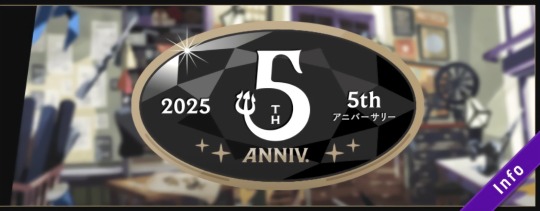

Five years of magic and memories and hope that we will be blessed with many more years to come with our beloved boys and this incredible game and fandom. Where has the time gone, eh? It feels like it was just March of 2020, doesn’t it? Time truly does fly when you are having fun and making memories.
Now what stands out with this new and unique background on the new TWST JP Anniversary Art?
I think this may actually be what they’re doing this year, paying tribute to Walt Disney! It would make sense- anime is 2D animation, Walt started with 2D animation and that’s what made Disney grow- their animation! The anime is coming out this year in October on Disney+ and what better way to say thank you to Walt than bring in a reference to his animation studio and the imagineers behind the magic that lives on today. Look closely in the image and you’ll see that what’s behind the anniversary logo is actually the Disney Animation Studio- or at least an equivalent to it!
See here:
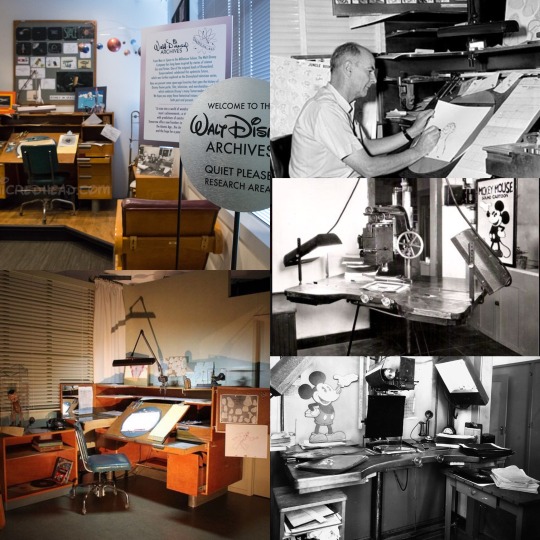
This has all happened before…
Last year we were given the chance to visit the studio in an event, the Red Carpet event featuring Vil, Ace, Azul, and Jamil. We got to visit the studio that started it all and learn the history behind the original filmmaking of Snow White and the Seven Dwarves. The event focused on Vil promoting the new live action movie The Beautiful Queen (their version of the live action Snow White). Snow White’s Live Action adaptation starring Rachel Zegler as Snow White and Gal Gadot as The Evil Queen (The Beautiful Queen) will premiere on March 21st of 2025, this year.
Read the event translations here
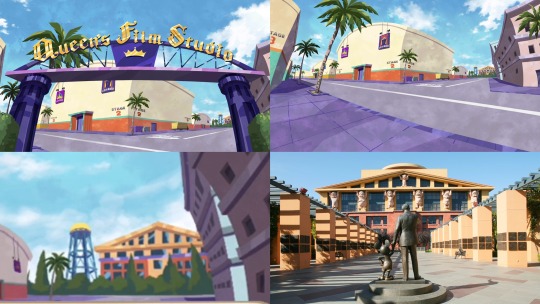
History of Snow White and its Connection to the TWST Story…
In the Red Carpet event (set to release on the EN server this month) we get to learn the history of the Walt Disney journey in filmmaking and how cutting edge technology of the time helped him become one of the most well known and influential people of all time in the world of film and animation, paving the way for others in the future of filmmaking, art, and animation.
The event itself was a love letter to Walt and the worlds and stories he brought to life. This was a time of firsts, a time of trial and error, but what came from it was spectacular- the world’s first full length feature film in colour was born. Snow White and the Seven Dwarves premiered in 1937 and showed the world what good ol’ fashioned American ingenuity could do- create a masterpiece that will be cherished forever.
See Here:
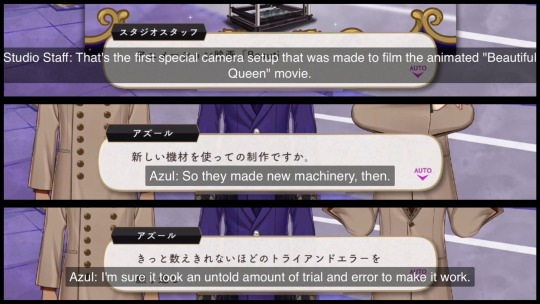
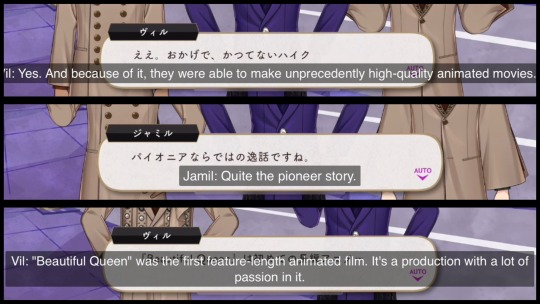
But, did you know that TWST has shown its deep ties to the classic film in more ways than one? No, we are not just talking about the mirror and the Pomefiore dorm, but Crowley, who has worn that stupidity hilarious Hawaiian shirt with apples, flowers, and crows (Pomefiore translates to “apple flower” by combining the French word for apple and the Italian word for flower), and the interesting voice line that incorporated the reference to 1937. No, you did not imagine it, he does indeed say 1,937. I could dive into more BUT that is for another post at another time….. stay (twist) tuned!
See Here:

I think, truly, that this may be an anniversary event that focuses more on the story aspect of the game’s history, one that ties these classic stories in more and deeper than already. Of course, there is still time before the event happens and we learn more but it’s definitely on the table.
What are your thoughts on this? Let me know with your reblogs and comments! I’d love to see your take!
I know I for one am looking forward to what is to come, I have high hopes for this anniversary celebration~
- Windblume

#windblume writes#twisted wonderland#twst#windblume rambles#twst analysis#twst theory#twst thoughts#twisted wonderland theory#twisted wonderland jp#twst jp spoilers#twst jp
26 notes
·
View notes
Note
Saw your comment on a post about Sound of Freedom and I came here to say.....shame on you. Shame. On. You. Since when is child trafficking a political issue? Since when is calling pedophilia bad a political issue? If you have a problem with this movie then maybe YOU'RE the problem. No better than the big Disney fat cats who tried to suppress this movie and keep it shelved. Or theaters messing with the ac and saying seats are sold out when they're empty. Shame on you! God's children are not for sale!
I wish people would do a little more research on this topic. If Hollywood and the "powers that be" didn't want this movie being seen, it wouldn't have been released in over 3000 theatres countrywide. It's being shown in major and minor locations all across America and Canada, and the vast majority of those locations aren't having any problems.
Case and point, my own mother and her friend went to see it last week and everything was fine. No issues whatsoever and the seats were packed. The movie isn't being "suppressed". This is all a marketing gimmick from the production company Angel Studios, a Christian streaming service. The movie is jam-packed with lies and only serves to glorify Tim Ballard, the man the movie is based on, and Christianity as a whole. I truly wish this wasn't political, but it is. They made it political.
Tim Ballard has provably exaggerated or fabricated many, if not most of his "rescues", and his organisation, Operation Underground Railroad, has been widely criticised by professional anti-sex trafficking organizations (including other Christian-based ones) for years. He has accumulated millions of dollars for his so-called "non-profit" organisation, and he runs several for profit organisations on the side. Most of this money is presumably pocketed by Ballard and his cohorts, as millions is unaccounted for and only a sliver goes to OUR. It's not about "saving children", it's about money and spreading Ballard's religious ideology.
This is compounded by the fact that Ballard, before he left the CIA, was almost always the last officer to arrive on any scene where child sex trafficking was involved, yet he somehow has hundreds of stories where he's singlehandedly rescued children. In fact, the "true story" the film is based on, where Ballard apparently saved a five year old boy—who, by Ballard's own account, ran up to him, hugged him, and begged to be taken away—didn't even happen. According to court receipts from the arrest and trial of Earl Venton Buchanan (the pedophile in possession of the little boy), Ballard arrived at the scene long after the boy was rescued and taken into custody, and he was barely involved. The documents can easily be found online under the San Diego incident reports.

Ballard was also caught lying about saving one particular girl named Liliana, the literal poster child for OUR. As it turns out, Liliana rescued herself by escaping her captors when she was seventeen and being trafficked in New York. Even more egregious, every time Ballard told her story, he would lower her age to garner more sympathy ... as if her being seventeen wasn't sad enough. In one instance, he claimed she was 14. In another, he claimed she was 11. Ballard also exploited Liliana's story as a reason for needing stricter border patrols and a better wall, despite the fact that she was being abused in America. There is no evidence to suggest OUR had anything to do with her rescue.
Ballard and his "organisation" have even ruined entire legitimate rescue operations in other countries and put children at risk, like in the Dominican Republic, where he endangered the lives of 26 girls by playing vigilante, being followed around by a camera crew, and causing a shootout that effectively traumatised the children he used as a prop to lure in buyers. His response to the mishap and rightful criticism by the Dominican police was basically, "Well ... you win some, you lose some."
The children were released without receiving any therapy or rehabilitative care, and Anne Gallagher, the leading global expert on the international law on human trafficking, said that OUR has an "alarming lack of understanding about how sophisticated criminal trafficking networks must be approached and dismantled" and went on to call the work of OUR "arrogant, unethical, and illegal". Those children easily could've been shot and killed. This occurred in 2014, but Ballard still insists that his "rescues" be filmed, and he even pitched it as a reality TV show. His reasoning for this, he says, is to "spread awareness", but we all know it's because he loves the spotlight.
Entire law enforcement agencies have actually cut ties with or even condemned OUR, such as Washington State Law Enforcement, as a result of Ballard's proclivity to conflate child sex trafficking with consensual adult sex work. Ballard and OUR regularly set up sting operations and lambasted the men who showed up for kink play, publicly branding them as pedophiles, even though the men in question were under the impression that they were meeting for sex with consenting, adult women. This led to several lawsuits against OUR, all of which they rightfully lost.
Ballard's means of gathering intelligence is also questionable, as he, by his own admission, sometimes consults psychic mediums for information on missing children and asks where they're being held captive. I genuinely wish I was joking about that.
The main actor in Sound of Freedom, Jim Caviezel, also has ties to the Qanon movement, and Caviezel himself is a hardcore conspiracy theorist. He believes that Donald Trump is "the new Moses" and that "liberals [literally] drink the blood of children". This is ironic, considering Caviezel and Ballard both met Trump several times, yet never pressed him for information regarding Epstein's client list. Moreover, Caviezel and Ballard both donate to the Catholic Church, which funds the largest child sex trafficking ring on the southern border and has a history of rampant sexual abuse of children. Even more insane, Caviezel admitted to watching child porn, to apparently "get in character" for the movie. He claimed that if Ballard had to watch it, it only "made sense" that he'd have to watch it, too. To "motivate" him to fight child trafficking.
...Alright, bud.
Surprise, surprise, both men are also outspokenly anti-LGBTQ+, despite the fact that children/teens in that community are statistically more likely to be trafficked. The majority of child trafficking is not the result of random kidnappings, as the movie would have you believe. The majority of children are actually recruited into sexual exploitation by a family member or friend/boss. The majority of those children are also not generally passed around in Mexico, like this racist, white savior-oriented movie would have you believe, but they actually either stay in or end up in America. America is, in fact, the largest consumer of child porn and child sex slaves this side of the globe (and nearly the largest producer), yet the movie depicts almost every pedophile as Mexican or some other non-white race.
At the end of the movie, Ballard comes on screen and asks people to donate/buy tickets for others, so that the movie can spread awareness. This is why so many seats in certain theatres are empty, despite websites saying the seats are sold out. Whether or not Angel Studios is also shadow purchasing tickets to boost sales can't be proven, obviously, but I wouldn't put it past them. These "conspiracies" have all served to market the movie and boost ticket sales.
As for Disney trying to keep the movie shelved, that's also a lie. Yes, Disney did technically shelve the movie when they bought Fox, since it didn't exactly correspond with its family-friendly brand, but they had no problem with the movie being released under a different studio. The actual reason Sound of Freedom was in "production hell" for five years was because Tim Ballard kept trying to milk donations. Despite the fact that filming wrapped up in 2018, he kept asking for more and more and more. He used people's faith and understandably emotional response to something as wicked as pedophilia to rake in millions. That's what Ballard is really about, money and stardom. In the movie, there's even a post-credit message where Jim Caviezel says the movie was held back to "maximize its distribution and raise awareness about child sex trafficking".
Translation: Ballard greedy.
Ballard himself admitted the accuracy of this movie "isn't important", and that he just wanted to get the movie out to "spread the word". By that, he of course means the Christian word—but why should fighting child sex trafficking be tied to religion? At the end of the day, Sound of Freedom is a vanity project, and it spreads incredibly dangerous misinformation. Stranger still, Ballard left the OUR just prior to the debut of Sound of Freedom, a fact he's neglected to mention in every interview regarding the movie. It's not clear why he left, but it seems that he fled after an internal investigation into the organisation began. That's not too suspicious or anything. My guess is authorities are trying to find out were all that missing money went, and Ballard doesn't want to be there when they figure it out.
By the way, that final line you hit me with; "God's children are not for sale", the line from the movie that Ballard claims a fellow agent whispered to him while on a case, as well as the title of the movie, which another agent supposedly said to Ballard after a giant rescue operation—those were lies, too. No agents ever said that to him. The police reports for those cases, as well as the agents Ballard supposedly quoted, all said he was the last to arrive on the scene and those conversations never happened.
Ballard cannot be trusted and Sound of Freedom is based on a lie. It's a scam. Everything he does is a scam. All he cares about is spreading his ideology, making money, and looking like a superhero. And this is only the tip of the iceberg. Look into his other companies, and into the ex-military soldiers and police officers who left OUR because of how poorly trained their people are when it comes to rescue operations.

Every sane person knows pedophilia and human trafficking is wrong, but giving your money to Qanon-adjacent, right-wing leaning, LGBTQ+-hating, Catholic Church-sympathising, fame-chasing, money-hungry, perpetual liar Tim Ballard isn't going to help.
The best way to help out is learning about the signs of child trafficking. Keep an eye out for any children that might be getting abused. If you suspect something, report it, don't be a silent bystander. Volunteer within your community to make sure the children in your area have food and resources, support LGBTQ+ youth, and watch the other adults around you to ensure they're not acting inappropriately. You can also donate to social programs that create safe spaces for children and even apply for jobs that specialise in these fields. Don't go to see a movie just because it aligns with your religious beliefs, feel sad for a little while, then sit on your ass and let Tim Ballard handle everything.
#sound of freedom#tim ballard#jim caviezel#christianity#child trafficking#propaganda#angel studios#I can't believe you made me defend Disney
205 notes
·
View notes
Text
𝔐𝔞𝔠𝔥𝔦𝔫𝔢 𝔐𝔢𝔪𝔬𝔯𝔦𝔢𝔰- 𝔇𝔞𝔶 11: 𝔐𝔢𝔩𝔬𝔡𝔶
Summary:
Sammy's trial today was getting unruly and inexperienced musicians-in-training to carry a simple tune.

Rating: G/PG
<- Previous Part Next Part ->
"My Lord, if you please, do not pierce the drum head. We do not have any extra," Sammy muttered shortly. Of course it was an honor to be in his savior's presence, but he didn't expect for him to have such a disregard for fragile instruments.
"What?" The Ink Demon growled. "Where's the fun in that? You told me to hit the stupid thing."
"Gently, Ink," Audrey corrected for Sammy. The artist sat next to him, violin resting under her chin. She ran the bow across its strings, causing a high-pitched sound to pierce their eardrums. She quickly stopped. "... Sorry, everyone."
"Perhaps he needs some mittens," Allison piped up from behind the microphone.
"Good luck with that. You'd end up with a severed hand," Alice snorted from beside her.
"Who would like to try that idea?" The Ink Demon purred, tapping his claws against the drum head.
Sammy pinched the bridge of his nose. He was getting nowhere with this lot. Only Boris remained at attention with his flute. The wolf was capable of carrying a tune, thankfully. Meanwhile, Tom lurked by the in corner, refusing to participate but actively watching this disaster commence.
Bendy kept bouncing in his chair next to Henry with his tuba. "Come on! Are we going to get back to it or what?"
"If you all would cut the chatter, we might be able to," Sammy answered in exasperation. They had too much to get to, and they were barely five seconds into the song. An hour had agonizingly rolled by with little to no progress.
"How can we? These note sheets hardly make any sense," Henry replied, squinting to try and read the fine print. They had only reviewed it five times already. Sammy sighed.
"You've never played an instrument in your life, Stein?" Alice challenged and moved to stand next to Sammy.
"We went over this--" Sammy began before Bendy raised a hand.
"Sammy? Which is this? A treble cleft or a staff?" He held up his music sheet toward Sammy.
"Pretty sure that's a staff, Bendy," Henry chimed in at the same time Audrey added, "That's a cleft." Both artists stared at one another in confusion.
Something ripped. The Ink Demon stood behind the torn-up drum head, his claws still embedded in its surface. "... That was an accident."
Sammy felt like ripping his hair out-- not that he even had any to begin with. This was nothing like his previous life. The musicians he had worked with at the studio were experienced, more or less. At the very least, they knew the basic roots of sheet reading. His goal was to conduct them, keep them on track, and help correct mistakes when needed.
However, looking back on it now, Sammy never missed the constantly changing deadlines and overwhelming pressure he faced as lead musician. He'd spend days working on the perfect piece, only for Joey to come in a screw it all up claiming "It doesn't fit my vision". Many nights he had stayed up reworking an entire composition before the next morning.
He made music, he loved music. Sometimes he needed a reminder of that. This wasn't Joey's music department anymore. It was his. Perhaps he can learn a bit of patience in time.
#ink demonth#the ink demonth#batim#batdr#bendy and the ink machine#bendy and the dark revival#sammy lawrence#henry stein#allison pendle#thomas connor#audrey drew#the ink demon#ink demon#ink bendy#bendy the dancing demon#twisted alice#alice angel#buddy boris#music#some chaos#A bit rushed bc I've been busy#Apologies#fluff#machine memories#cloned's bendy fanfics
22 notes
·
View notes
Text
ace attorney case 1-3 “turnabout samurai” spoilers under the cut because its literally the absolute funniest ace attorney case
this case took me literally ten hours and every guide i looked up recommended like 2 and a half
in my defense (and also in defense of all two of phoenixs braincells) you are not hired. your fucking child spirit seeing companion is watching her favorite tv show when a news broadcast pops up that the main actor killed the main villain’s actor.
so sure you go see this fella cuz sure. why not. your spirit seeing adoptive little sister immediately proves to be rather unhelpful and absolutely incapable of being impartial. the main actor breaks down in tears every time you speak to him. at the studio you meet the fucking weirdest assortment of theatre kids + the japanifornia equivalent of one of the original star trek fangirls (who threatens to beat you up, which is later revealed to be a credible threat)
am i the only who thought penny nichols was the real killer at first ???
somehow you make it through the whole first day of trial before its revealed that the “blocked path” to the second studio actually had a beehive of weirdos behind it. these include a child paparazzo, an incel movie director (unsurprised on that front), and a literal mafia boss funding samurai movies and shows because shes bored.
at this point shit gets even weirder because edgeworth, your law appointed (and maya appointed) rival, starts helping you ??? some of the easiest contradictions phoenix completely whiffs with no player input and edgeworth immediately objects FOR YOU.
then in the end its revealed the mafia boss gets away scot free because it was ‘self defense’ to kill a man after blackmailing him for five years straight because he planned to get back at her and frame the main actor. also her literally threatening to kill phoenix and maya is never ever brought up.
and finally finally finally… edgeworth comes to you outside the courtroom and tells you to fuck off, that he ruined his career for you, that he never wants to see you again. (this is immediately followed by the next case being him focused)
oh also hammer apparently never thought through the implication of framing will powers for vasquez’s death because i literally could not think of any possible motive for powers to do that.
48 notes
·
View notes
Text
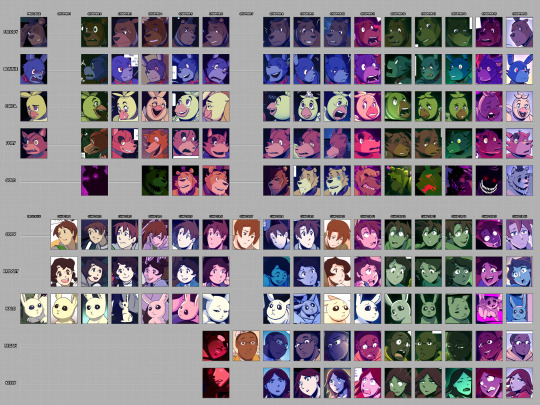
AAAAAYYYYY WE FINALLY MADE IT!!!!!
Six years later, and Lost Souls is in it's final chapter (and will be completed before the year ends YIPPEEE!!!) and I realized that I hadn't made good on something I said I would do: frequent comparisons between appearances of the characters to show how my art has changed and improved throughout the comic's run. Completely forgot. Oops...
So I figured what better way to celebrate how far we've come than to visually SHOW how different the start and the end are! Here we go! (LONG POST AHEAD!)
PROLOGUE
Not much to say about the first chapter--other than it shows its age. 💀 At the time I really struggled with contrast and color theory, because everything is muddy and blends together.
I found all the Fazbears challenging to draw, but I especially remember struggling with Chica the most SOLEY because of her beak--I was having difficulty wrapping my head around making it look the way I wanted it to. Once I let myself treat Chica's beak less like an actual beak and more like a pair of extra thick lips she became one of the easier characters to draw.
CHAPTER ONE
Its so weird seeing where my blood children started and where they ended up design-wise. Cody's hair is a lot more tamer in style in these first chapters, and it took a while to get the hang of how I wanted to depict Bridget's wavy hair.
CHAPTER TWO
UGGHH MORE MUDDY COLORS GET IT AWAY GET IT AWAY
Back during this chapter the fog looked more like actual fog than a manifestation of all the animal souls Gold had collected and tenuously tied together with sheer force of will. All I can say is I guess I was still figuring out the art direction I was going.
CHAPTER THREE
I was REALLY proud how I subverted expectations by not letting Cody or Bridget faint upon meeting the Fazbears. XD
I also did this dumb thing where I would block the farther limbs in shadow to try and save time (you can see it most notably on Halo and Bonnie's ears.)
This did not in fact save much time and ended up looking kinda dumb and making people think characters were missing limbs. >_<
CHAPTER FOUR
Character designs are notably more consistent.
Here was where I dropped using Photoshop Elements 7 for my drawing and used Krita. I still used Photoshop for finishing details etc.
CHAPTER FIVE & SIX
If I had to pin a chapter in which character designs were pretty much solidified, it would be these chapters.
CHAPTER SEVEN
The only major characters here are Cody and Regan.
I made this chapter during the height of 2020. So naturally I was in the throws of a MAJOR depressive episode.
I took a lot of short cuts in an attempt to just get this chapter DONE. Don't know if it's noticeable or not, but yeah it was rough.
I didn't include the Bidibabs and Minireenas because there's too darn many if them, and they're not always grouped together for the most effective comparison shots.
CHAPTER EIGHT & NINE
Grouped because eight wasn't particularly noteworthy.
Other than it's where I made the switch to Clip Studio Paint.
I had experimented with it when I made the prior Crybaby chapters and fell in love with the program before I even finished the free trial.
CHAPTER TEN
Ooh I was SO anxious for this chapter, because here was when the story would reach the point of no return--it was literally all downhill from here and I wouldn't be able to just drop the comic if I lost interest.
(But I didn't! )
Point being, lots of anxiety surrounding this chapter.
CHAPTER ELEVEN
Here is officially past the event horizon. At this point I had no idea how much farther I had to go in spite of the fact it was the start of the final night.
CHAPTER TWELVE
We officially enter the labyrinth here, and it is here where I officially decided I HATE the color green.
I really don't know what it was, but there wasn't many things I could do to make the characters stand out from the sheer GREEN of the vicinity, and it muddied up a lot of the colors of the characters.
Thankfully I had more experience under my belt to balance it all out (I hope 😬)
CHAPTER THIRTEEN
More green.
So much green.
CHAPTER FOURTEEN
Which is why when Cody's group went into the mirror maze I switched it up and went more aquamarine/turquoise to make it more bearable for me.
Making the light emit from the glow-in-the-dark floor panels was a happy accident--I wad playing around with layer modes and the Add Dodge (Glow) layer mode in CSP caused an interesting effect that I took and ran.
Markiplier cameos here. (And dies. Sorry Mark.)
CHAPTER FIFTEEN
The double uploads started here and OH MY GOD I can't believe I managed to survive it. I really put my pedal to the metal here, and I came out on top!
(It was a race against myself really but HOT DAMN I WAS ON FIYA.)
Side note: this chapter went through SO MANY rough drafts guys it's not even funny.
The vibes weren't jiving, the pacing was all skiddly-wompus, and at one point the chapter was FIFTY PAGES LARGE (HELL NAW)
Its a miracle I'm alive man
Do your stinkin thumbnails guys--they saved my life
CHAPTER SIXTEEN
This was the hardest chapter to finish, if you can believe it.
It took the longest production-wise, because after SIX YEARS of non-stop comic work I was definitely burned out. Thank god I had already solidified the script and thumbnails beforehand because with that guide rail in place I could drag myself across the finish line by my fingernails because if there was ONE THING I DIDN'T WANT IT WAS A FRICKIN RUSHED ENDING. >:[
(Burned by too many unsatisfying webtoon/webcomic endings that basically went "and we lived happily ever after 😌")
Visually this is my favorite chapter. I love how the colors turned out, and all the characters felt truly "mine."
And that's that!
Man I started writing a whole paragraph and I realized that I should PROBABLY save it for the Afterword, when the comic is well and truly finished. So I'll hold off on that big ol' schpiel until then, but I will say:
THANK YOU FOR STICKING WITH US THIS FAR!
💖💕😘💕💖
#ChiwwysComics#FNaFLostSouls#ChiwwysFanart#FNaF#comics#fanart#fan comic#fnaf#fnaf fanart#fnaf fancomic
45 notes
·
View notes
Text
So I found a really fun visual parallel between Harrow and Deep Cover today.
For quick and easy reference these are all of my posts regarding this prisoner.
Kotoko Yuzuriha
July 8, 2023 Dissociation Gang Round 1 July 13, 2023 Dissociation Gang Round 2 July 17, 2023 Um hey- what the fuck??? (goes over everything in her basement studio and the animal pelts.) July 19, 2023 The Notorious Five (Seriously discusses their covers songs even though it's been stated those are just for fun but are chosen with the character in mind to an extent.) August 12, 2023 Obligatory Yuno mention (This continues the dissociation gang thing. As I point out the glitched switching within in Tear Drop and relate it to that briefly.) January 17, 2024 Possible reason for the pairing of 09 & 010 January 18, 2024 Deep Cover Analysis Stage 1 January 18, 2024 Defining Grooming (Status: Irritated.) February 3, 2024 Kazui and Kotoko Similarities and Parallels March 25, 2024 Second trial First Interrogation Question (Status at time: Bored) March 27, 2024 Second trial Third Interrogation Question (Status at time: Annoyed) April 3, 2024 Won't tolerate sin? April 3, 2024 Persecution & Ableism
And many others not tagged probably.
I have written so much on all these characters. I could make lists for all of them. Yet the one pertinent to this post would be July, 17, 2023 Um, hey- what the fuck?
Because the parallel I'll be showcasing here can be directly tied to points made there.
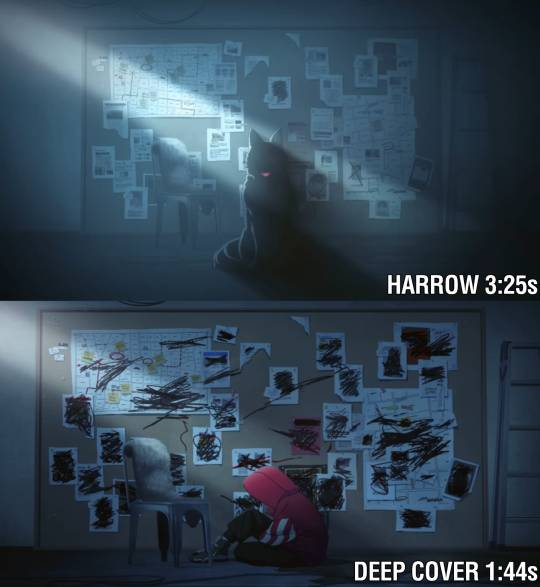
Though this very well may be another visual interpretation of the same scene. Since as we know from Harrow and Deep Cover showing it more blatantly the wolf represents Kotoko anyway. Also since Kotoko was working over time trial one to make the focus of her music video just that one guy despite it still being implied there were other victims it wouldn't be strange for the paper relating to that to be the only one scratched of at the end of Harrow.
Yet, in Deep Cover everything is crossed out in some area displaying the accurate number of attacks or the progression of her behavior. Also in the Deep Cover shot we get a clearer image of what I highlighted in the Um hey-what the fuck? post the pelts.

We can see both pelts clearly in this image something that's a fair bit more difficult to see in the image from Harrow.

Because of the lighting. The way the light is shining in can be considered indicative of the time of the day. So it could be around sun down in Harrow or just more cloudy outside given it was raining as she attacked that guy and it stops after she finishes and since Kotoko is in her murder fit when she's down in this room in Deep Cover.
A outfit she is never shown wearing inside this room throughout all of Harrow but the hoodie is shown to be hanging on the chair at the beginning of it.

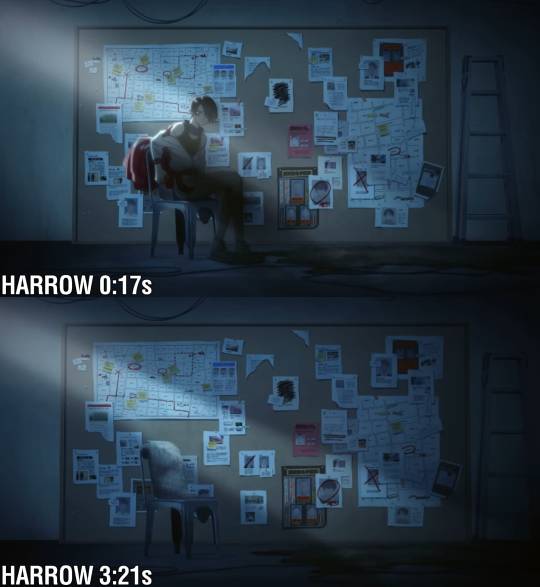
Jacket circled for convenience here,
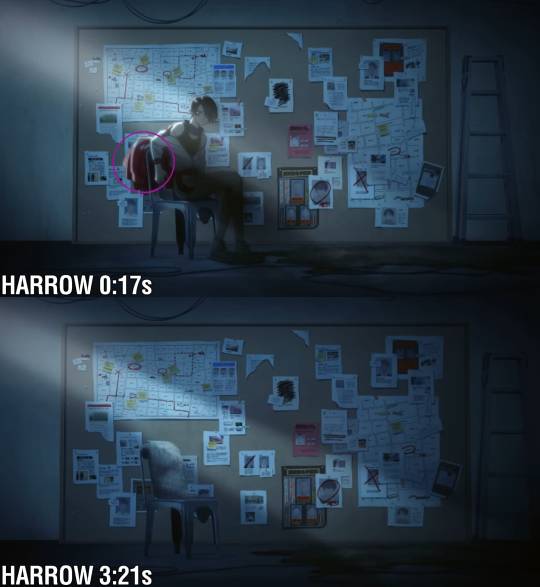
It's fair to reason that the sequences when this jacket are shown in this area happened after the attack and murder. She probably started with sitting on the floor then got up hung her jacket on the chair and sat down.
The end of Harrow where we see the area without Kotoko or her jacket is probably during the crime as illustrated though. However those two pelts are there within Harrow from the very start.
Here's a version I edited to circle the areas where the pelts are.
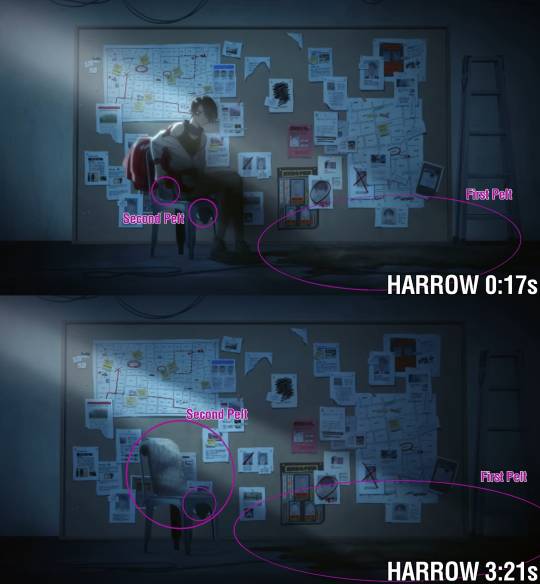
Deep cover only makes them a bit easier to see do to the better lighting. So yeah that's why I'm saying these scenes are paralleling each other or are the same scene depicted two different ways.
13 notes
·
View notes
Note
Okay but can the royal family be called to serve jury duty?
We were talking about this in comments briefly! I've been thinking about it since.
I think the discussion is predicated on the idea that Askazer-Shivadlakia even has trial by jury. France apparently only has jury trial for felony level crimes, while Italy doesn't use juries at all (they have a council of judges). Askazer-Shivadlakia has a number of cultures tugging on it, but given they speak English due to an occupation, probably they have a jury trial format of some kind. Perhaps with only five or nine jurors (Italian Judges Style) instead of twelve. In any case, let's assume they do.
Alanna and Jerry aren't elected or immediate family, they have paid staff positions -- although this made me think that Michaelis and Miranda offered Alanna the title of "princess" as a teen, because of her close relationship to them and lack of parents, although she probably didn't really need it, given her grandparents. Anyway, let's also put Jes in this category of "not royal", because they hold no official title or staff position but have a clear association. Michaelis and Noah are Royals but Michaelis is retired and Noah is appointed, so they have similar status to staff. Eddie, too, is "royal but not elected" and his main function is paid staff much like Al and Jerry. So really it's just Gregory who might legally be exempt. In the US, at least, elected officials at the federal level are. So let's presume that getting elected to king exempts you from jury service until you leave office.
Michaelis, Eddie, and Noah (once he turns eighteen) could be summoned to appear, but would immediately be disqualified from criminal cases because they're affiliated with the Crown and could be argued to have an unconscious bias. What we were discussing in comments was in part my thought that Michaelis, who became king (and thus disqualified) very young and ruled most of his life, would be rather excited for a novel civil service experience, and disappointed when he was dismissed.
I think pretty much any of the royal family except Gregory would be qualified to serve, and allowed to in a civil case (Jerry, Alanna, and Jes would also be fine in a criminal case). Jerry and Al are famous-ish as the local nobility, Jes is a famous journalist, and Michaelis, Noah, and Eddie are royals, but I did a bit of research and I guess celebrities aren't given any kind of special exemption usually. And it's canonical that the Shivadh find celebrities amusing at best, so I doubt their presence on a jury would even be particularly disruptive. So yeah, I could see the royal family serving jury duty.
But my brain is a bit sidelong, so while it would be entertaining to write that story, I was thinking more about...hearings, court protocols, the hierarchical structure of the courtroom, and the weird way in which everyone in a court is pushed into a very specific role. I'll probably write more about that in a general sense later, but where it took me was the idea that Gregory, as a king who has a parliament he has to obey but also certain specific unilateral power, might hold something like a quarterly "King's Boon" session ala the Big Block Of Cheese Day from the West Wing.
Some period of time, every few months, he basically holds open office and meets with people who are struggling to get heard in other ways -- people who want to suggest new laws, or want state funding for something, or need help untangling some bureaucratic issue. One person might have an idea for a law but not the legal training to write it up; Gregory might put them in touch with Palace legal, who can help them draft it for presentation to Parliament. Someone else might be having trouble with some kind of bank issue, Gregory can call up the bank and be like "Hey I'm the king and I'm here with one of your clients, let's get this solved before I audit you." When the recording studio collapses at the start of Infinite Jes and Michaelis says "I'm going to have a word with the government about building inspections", if he wasn't the former king he might take that kind of issue to the King's Boon. Two ordinary people who are arguing about some issue but don't want to take it to the courts might ask Gregory to decide the matter for them. Could be who owns the tree in their mutual front yard, could be some kind of philosophical argument they've got a bet about and they're willing to let Gregory rule on it (this is also very Talmudic, the idea of finding a Sage to figure your shit out for you).
And the nice thing is, much like in the West Wing, this is something Royals and palace staff would participate in -- so when Michaelis was king, he and Miranda would both participate (as would Eitan, as Well Connected Nobility); eventually Gregory as prince and then crown prince would participate as part of his training. It's basically "you, too, have a friend in high places" week in the Palace.
So you've got, say, King's Boon Week, where you get a number, show up on your appointed day, and hang out in the ballroom, which has been converted to a waiting room with nice chairs and snacks (presumably people who can't make it in person can get a Zoom call set up). You wait to be called, and you might meet with Gregory, but you also might meet with Eddie, Michaelis, Alanna, or Jerry. Noah would also participate but for a few years he'd be sitting in with Michaelis as training. Eddie would sit in with Gregory for a year or so after officially becoming King Consort, until he had a more thorough grasp of things. I have a feeling Jes would spend the time circulating and interviewing people for a quarterly podcast. :D
That just seems like a cool thing that is possible to achieve given the size and informality of the country, and would make I think potentially a more interesting story.
I mean. Just imagine. You're having trouble getting the permits all in order for the nightclub you want to open, and you're hoping to get Lady Alanna because you know she's got every bureaucratic "in" it's possible to have. But you groan a bit because you draw Duke Gerald, who...sure he's nice, but you've heard he's a daft scatterbrain. But then you meet with him and he goes through your business plan and is like "This is really solid. Let me make a call," and while you're gaping at him he calls a friend in Legal, gets your paperwork in order, phones a guy he knows who has a vacant building that you can lease on the cheap for the first year or two, and then looks you dead in the eye and says, "Do you need investors? I'd take a thirty percent stake in this," and you wander back into the waiting room, dazed, to inform your business partner that you've struck a deal for each of you to sell 15% of the nightclub to His Grace the Duke of Shivadlakia.
Now THAT'S a fun story. :D
(Eddie is like "Just herd anyone who wants to open a restaurant into my office," and the quality of the food in Fons-Askaz, already pretty good, shoots up a notch that year.)
149 notes
·
View notes
Text
God of War: Ragnarok free DLC ‘Valhalla’ announced
Gematsu Source
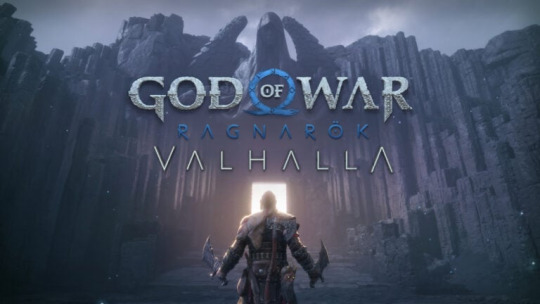
Publisher Sony Interactive Entertainment and developer Santa Monica Studio have announced God of War: Ragnarok free downloadable content “Valhalla.” It will launch on December 12.
Here is an overview of the downloadable content, via PlayStation Blog:
(Spoilers for God of War: Ragnarok below)
Journey to Valhalla
God of War Ragnarok: Valhalla will be an epilogue to the events of God of War Ragnarok that follows Kratos on a deeply personal and reflective journey. Set after the decisive battle against Odin and Atreus’ departure, Kratos has seen a path for himself that he never thought possible before. Brought to the mysterious shores of Valhalla accompanied only by Mimir, Kratos will enter its unknown depths to overcome trials within himself and face echoes of his past.
Combat Reimagined
The team here at Santa Monica Studio challenged ourselves to make something different from anything we have done before in God of War history. God of War Ragnarok: Valhalla celebrates the combat you know and love from God of War Ragnarok and blends it with fresh, experimental elements inspired by the roguelite genre. Each attempt in Valhalla will encourage you to master different aspects of Kratos’ arsenal as you face new combinations of enemies and some surprises along the way!
Fight, Learn, Grow
In Valhalla, defeat in combat is not the end of a warrior’s spirit. If Kratos falls, he will reawaken outside the doors ready for the next try. During each attempt, you will learn and adapt to the challenges Valhalla has to offer. The more you overcome, the more resources you’ll gain that can be put towards permanent upgrades that affect both Kratos and even Valhalla itself. Accumulating rewards and knowledge during your attempts will help you get ever closer to discovering the mysteries that await Kratos within.
Master Valhalla, Master Thyself
The shore of Valhalla humbles all those who wish to enter. Kratos must cast off his armor and equipment, and instead build towards both per-attempt and permanent rewards. Kratos will have access to all his weapons and fully-upgraded skill trees at all times, but must commit to a shield and path of Spartan Rage for each attempt. As you overcome the trials of Valhalla and explore its depths, you will make choices between temporary Glyphs for which Stats to upgrade, which Perks to select, which Runic Attacks to wield, and more. Each attempt can play out differently based on the rewards you choose, so keep your strategy in mind when making selections! Wise preparation, adaptability to the challenge at hand, and command of your abilities will be the keys to mastery.
Play in Style
Armor in Valhalla is for appearances only, so don’t hold back when customizing for style! Unlock different looks, then mix and match your favorites between attempts to get Kratos looking fighting fit for all your Photo Mode needs.
Choose your Challenge
God of War Ragnarok: Valhalla has five difficulty settings that have been specially crafted and tuned to the unique gameplay of the downloadable content. Each difficulty setting increases the rewards you’ll gain from battle, and you can swap freely among them between attempts (including to and from the highest difficulty setting, Show Me Mastery). As your skills grow, we encourage you to try out some of the higher difficulties to earn more rewards and test your mastery over Kratos’ arsenal! Between the five options, you will be able to select the level of challenge that is most fun for you. To help further customize your gameplay experience, the downloadable content will continue God of War Ragnarök’s standard for accessibility settings.
Play at Any Time
God of War Ragnarok: Valhalla is a separate experience from God of War Ragnarök, so you don’t need to worry about going in without certain upgrades, equipment, or story progress. If you think the DLC sounds fun, you can jump in at any time! However, if you are concerned about narrative or gameplay spoilers, we do recommend that you finish God of War Ragnarok first as God of War Ragnarok: Valhalla serves as an epilogue to the story of the base game.
A Gift to the Fans
If you own God of War Ragnarok, you will be able to download God of War Ragnarok: Valhalla for free on December 12 at PlayStation Store. On behalf of everyone at Santa Monica Studio, we want to wish everyone a happy holiday and extend our heartfelt gratefulness for the incredible support you’ve shown us over the past year. We truly are fans of our fans, and we hope you enjoy God of War Ragnarök: Valhalla when it comes out next week. We can’t wait for you to play and share your experience with us by using #GodOfWarRagnarokValhalla or #GoWRV on social.
God of War Ragnarok is available now for PlayStation 5 and PlayStation 4.
Watch the announcement trailer below.
Announce Trailer
youtube
#God of War Ragnarok: Valhalla#God of War: Ragnarok#God of War#Santa Monica Studio#Sony Interactive Entertainment#PS4#PS5#Gematsu#Youtube
65 notes
·
View notes
Text
youtube
God of War Ragnarök: Valhalla - Reveal Trailer
The free "Valhalla" DLC for God of War Ragnarök will launch on December 12, 2023.
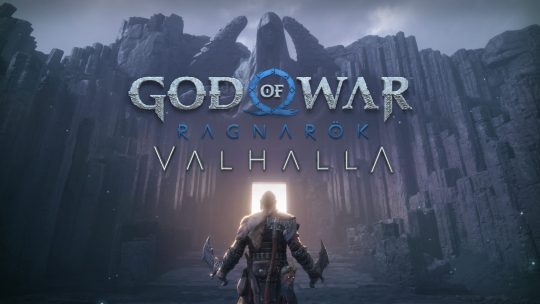
Key visual
First details via PlayStation Blog
Journey to Valhalla
God of War Ragnarok: Valhalla will be an epilogue to the events of God of War Ragnarok that follows Kratos on a deeply personal and reflective journey.
Set after the decisive battle against Odin and Atreus’ departure, Kratos has seen a path for himself that he never thought possible before. Brought to the mysterious shores of Valhalla accompanied only by Mimir, Kratos will enter its unknown depths to overcome trials within himself and face echoes of his past.
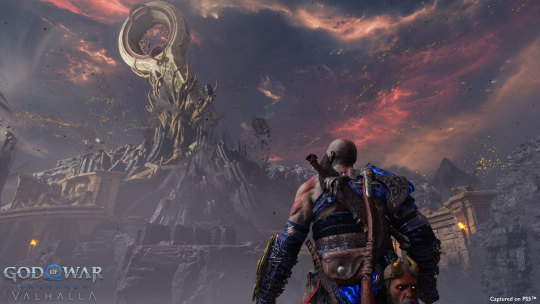
Combat Reimagined
The team here at Santa Monica Studio challenged ourselves to make something different from anything we have done before in God of War history. God of War Ragnarok: Valhalla celebrates the combat you know and love from God of War Ragnarok and blends it with fresh, experimental elements inspired by the roguelite genre.
Each attempt in Valhalla will encourage you to master different aspects of Kratos’ arsenal as you face new combinations of enemies and some surprises along the way!
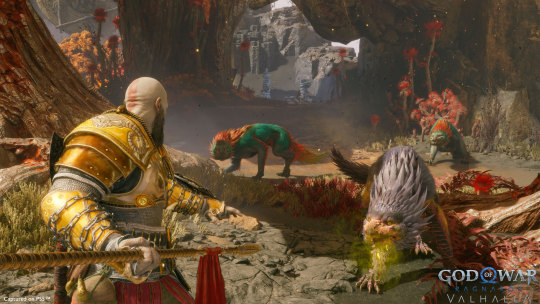
Fight, Learn, Grow
In Valhalla, defeat in combat is not the end of a warrior’s spirit. If Kratos falls, he will reawaken outside the doors ready for the next try. During each attempt, you will learn and adapt to the challenges Valhalla has to offer. The more you overcome, the more resources you’ll gain that can be put towards permanent upgrades that affect both Kratos and even Valhalla itself.
Accumulating rewards and knowledge during your attempts will help you get ever closer to discovering the mysteries that await Kratos within.
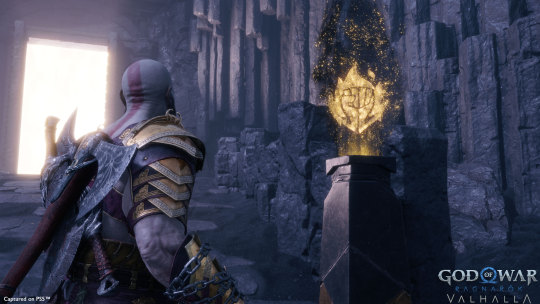
Master Valhalla, Master Thyself
The shore of Valhalla humbles all those who wish to enter. Kratos must cast off his armor and equipment, and instead build towards both per-attempt and permanent rewards.
Kratos will have access to all his weapons and fully-upgraded skill trees at all times, but must commit to a shield and path of Spartan Rage for each attempt. As you overcome the trials of Valhalla and explore its depths, you will make choices between temporary Glyphs for which Stats to upgrade, which Perks to select, which Runic Attacks to wield, and more. Each attempt can play out differently based on the rewards you choose, so keep your strategy in mind when making selections!
Wise preparation, adaptability to the challenge at hand, and command of your abilities will be the keys to mastery.
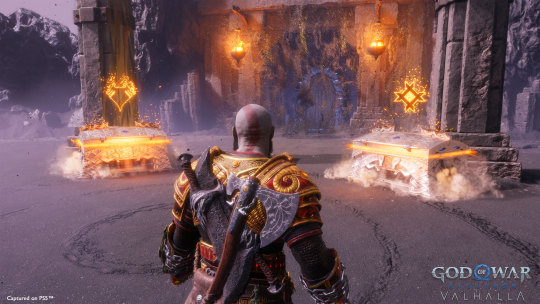
Play in Style
Armor in Valhalla is for appearances only, so don’t hold back when customizing for style! Unlock different looks, then mix and match your favorites between attempts to get Kratos looking fighting fit for all your Photo Mode needs.
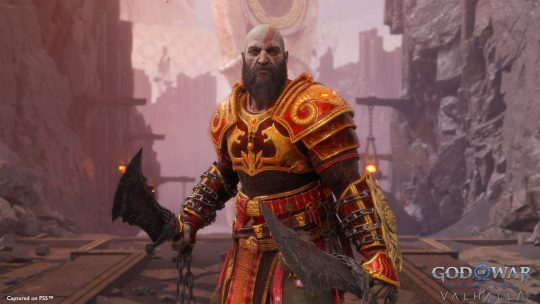
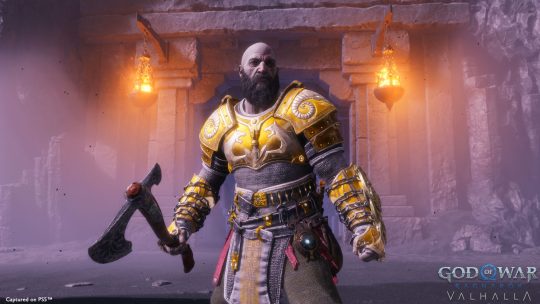
Choose your Challenge
God of War Ragnarok: Valhalla has five difficulty settings that have been specially crafted and tuned to the unique gameplay of the downloadable content. Each difficulty setting increases the rewards you’ll gain from battle, and you can swap freely among them between attempts (including to and from the highest difficulty setting, Show Me Mastery).
As your skills grow, we encourage you to try out some of the higher difficulties to earn more rewards and test your mastery over Kratos’ arsenal!
Between the five options, you will be able to select the level of challenge that is most fun for you. To help further customize your gameplay experience, the downloadable content will continue God of War Ragnarök’s standard for accessibility settings.
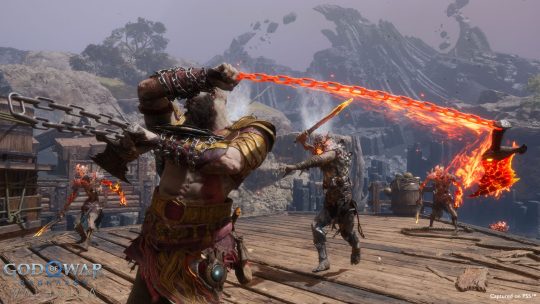
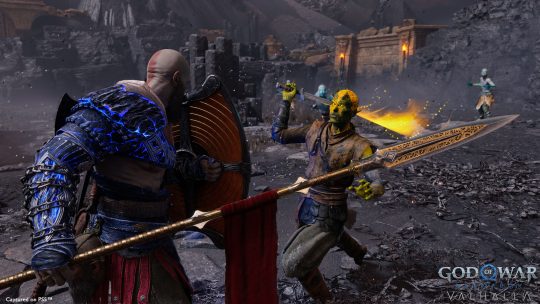
Play at Any Time
God of War Ragnarok: Valhalla is a separate experience from God of War Ragnarök, so you don’t need to worry about going in without certain upgrades, equipment, or story progress. If you think the DLC sounds fun, you can jump in at any time!
However, if you are concerned about narrative or gameplay spoilers, we do recommend that you finish God of War Ragnarok first as God of War Ragnarok: Valhalla serves as an epilogue to the story of the base game.
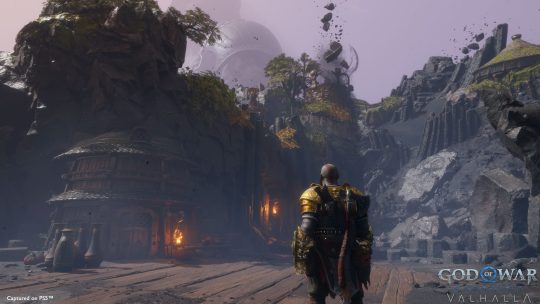
A Gift to the Fans
If you own God of War Ragnarok, you will be able to download God of War Ragnarok: Valhalla for free on December 12 at PlayStation Store.
On behalf of everyone at Santa Monica Studio, we want to wish everyone a happy holiday and extend our heartfelt gratefulness for the incredible support you’ve shown us over the past year. We truly are fans of our fans, and we hope you enjoy God of War Ragnarök: Valhalla when it comes out next week. We can’t wait for you to play and share your experience with us by using #GodOfWarRagnarokValhalla or #GoWRV on social.
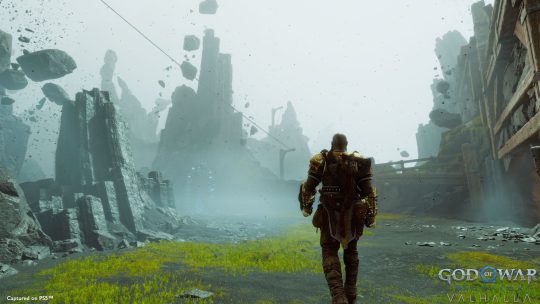
#God of War Ragnarok#GoW Ragnarok#God of War PS5#God of War#SIE Santa Monica Studio#Sony Interactive Entertainment#video game#PS5#PS4#The Game Awards 2023#TGA 2023#long post
63 notes
·
View notes
Text
One of my favorite things is finding out what software/device someone uses for their artwork and (if they're not using Procreate) being like "Have you tried CSP?" then linking them to get the trial version to see if it works for them.
Within a day they're like "Well. I'm using this forever now."
This has happened five times and it's always a great experience. I'm not exaggerating when I say that this program has literally changed my life, allowing my art to improve in spite of my physical condition continuing to degrade over the years. If you're not an iPad baby with Procreate and you want a program that is actually designed for artists, look into Clip Studio Paint—not Photosh○p.
The standard version of CSP for laptop/desktop is around $55 USD at a stretch (and it's $22 USD right now because there's a sale) for a perpetual license that is yours forever; you can get a subscription to get early access to new CSP features as they're implemented, and it's $10.99 per year for the standard version on top of the perpetual license—if you cancel the sub, you lose access to features outside the base version for which you purchased a perpetual license, but you get to keep that base program. Even the mobile version of CSP, which is on a subscription in order to stay up to date with mobile OS updates and maintain compatibility, is under $30 for a year when purchased direct from CELSYS.
The cheapest sub option for Photosh○p is currently $14.99 per month, Ad○be will charge you for six months upfront if you cancel, and you lose access to the program entirely (even though you just paid for six months) until you re-up the sub.
I'm not even gonna go into performance differences here. Just...trust me on this. If you're going to spend money on a digital art program, try CSP and see if it works for you. If it doesn't, that's fine! But you don't lose anything on a free trial, y'know?
And, before anyone tries to sweep in with some trash argument about CELSYS being in support of gen·A·I, there was an experimental gen·A·I feature that they announced a couple years ago and then immediately rolled back when the community raised objections. At the time, gen·A·I was not yet a particularly hot-button topic in Japan, where the company is based, and the implementation they had in mind was intended to assist in drafting, composition, and postprocessing, not the creation of full pieces. Rather than insisting that they were right and it wasn't their fault if people wound up using it unethically, CELSYS scrapped all plans to implement the feature and made a public apology for their negligence and lack of education on the issue. They have since even banned gen·A·I work from their asset marketplace.
Meanwhile, Ad○be uses gen·A·I slop images on their social media, their advertisements, their corporate literature, their webpage, and on Photosh○p's launcher.
If you're a digital artist, try CSP. It's $22 USD for the next two days, less than $60 even when it's not on sale, and once you have it, it's yours forever.
13 notes
·
View notes